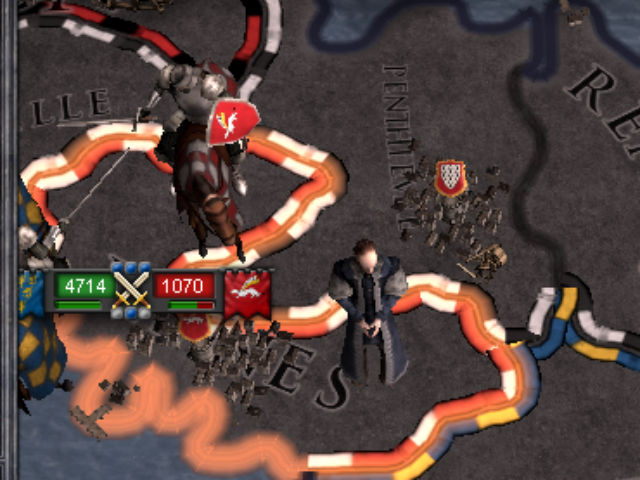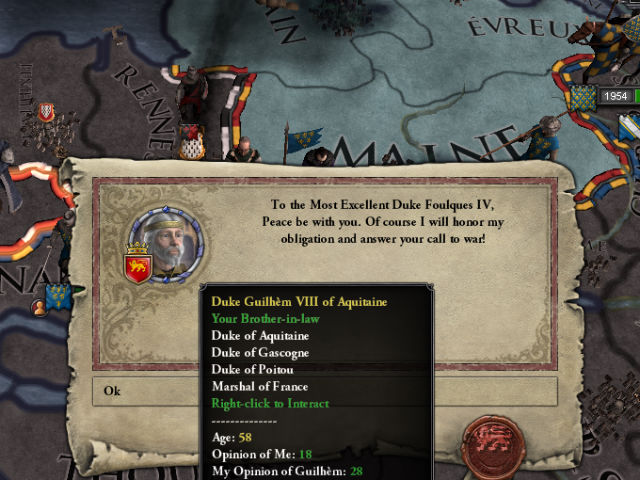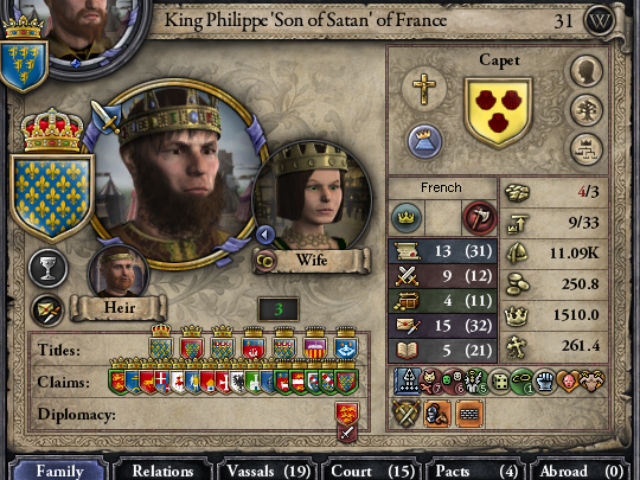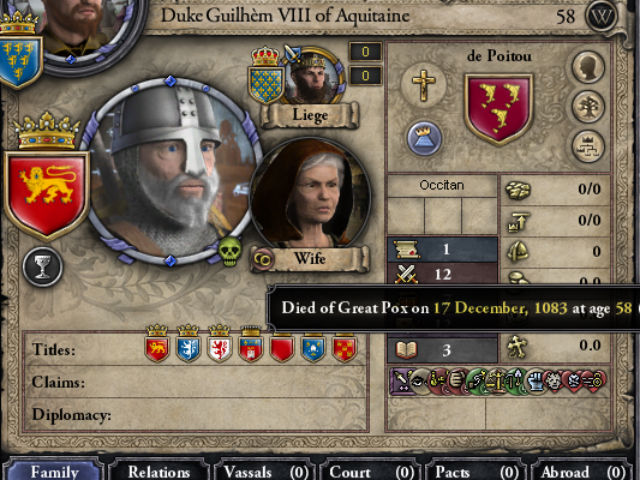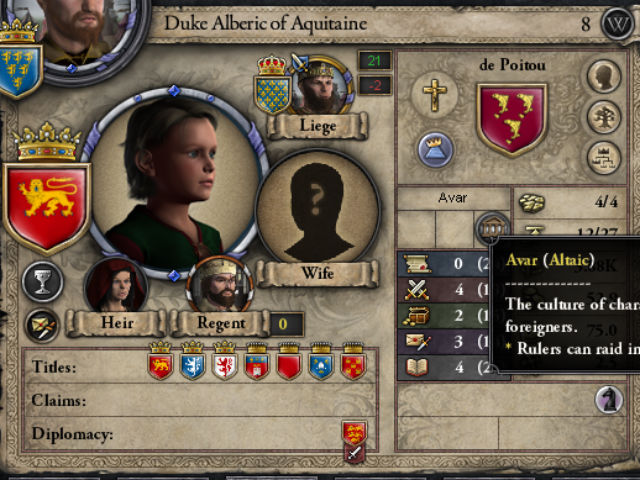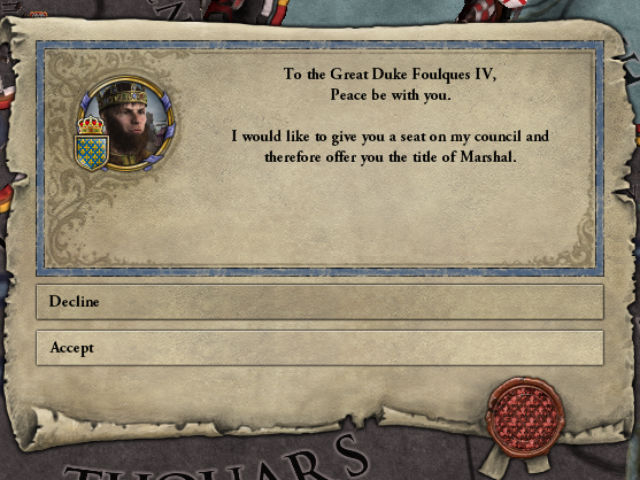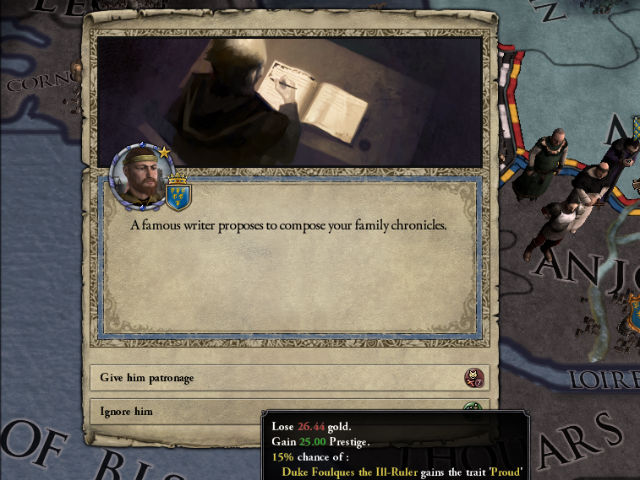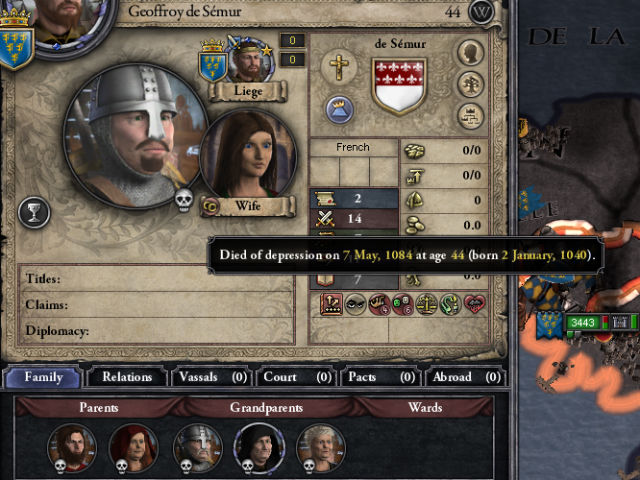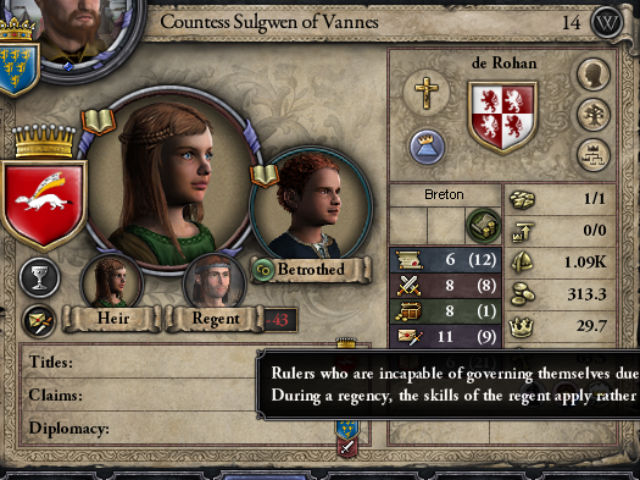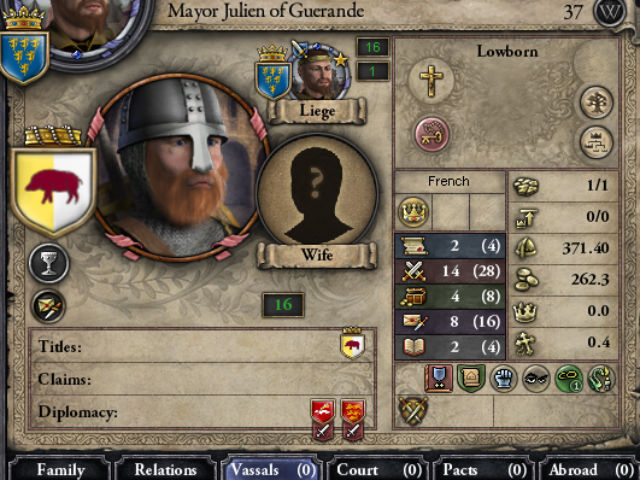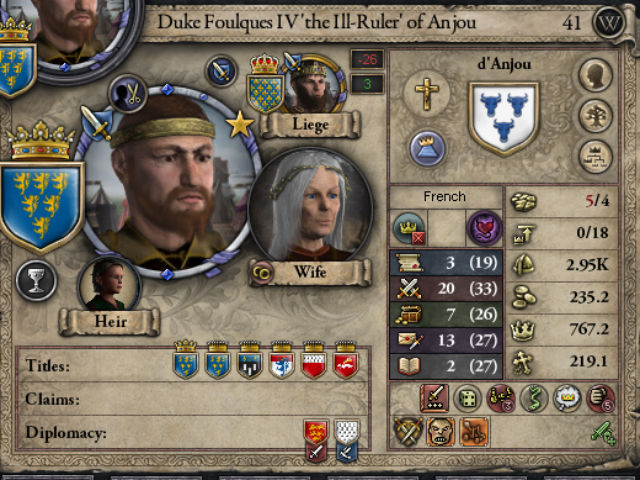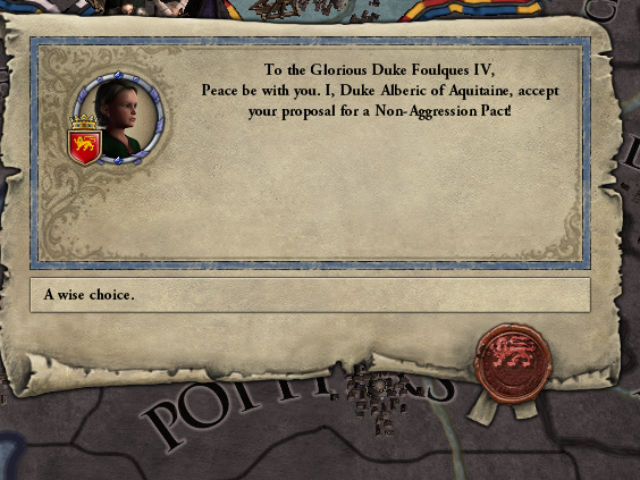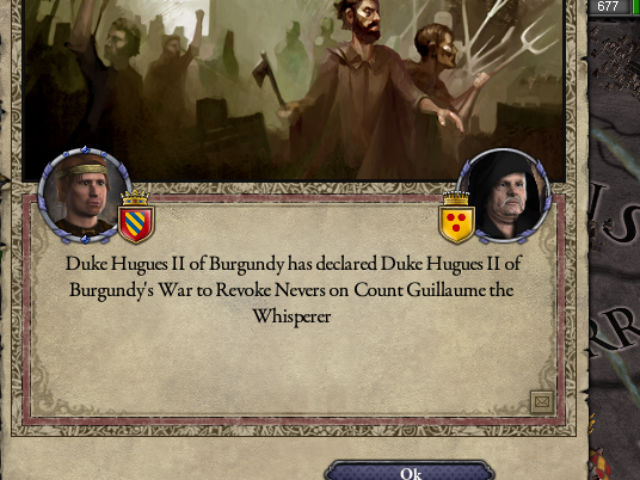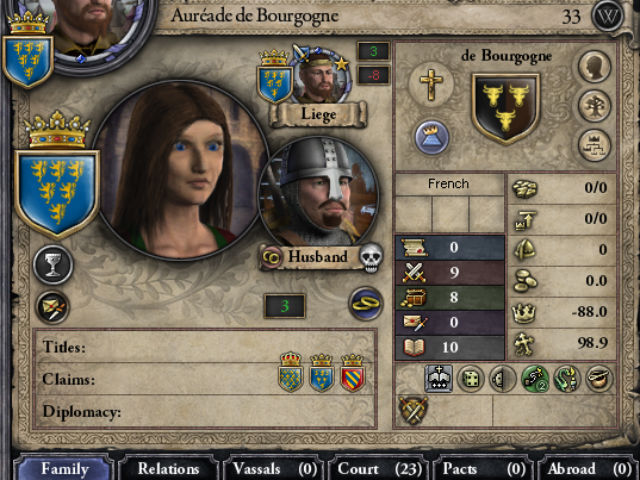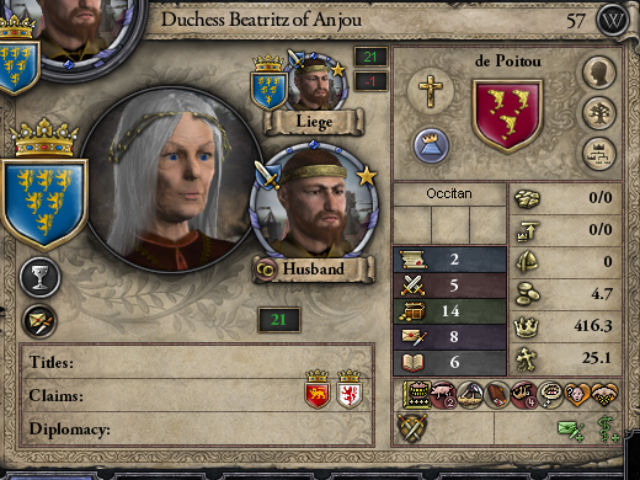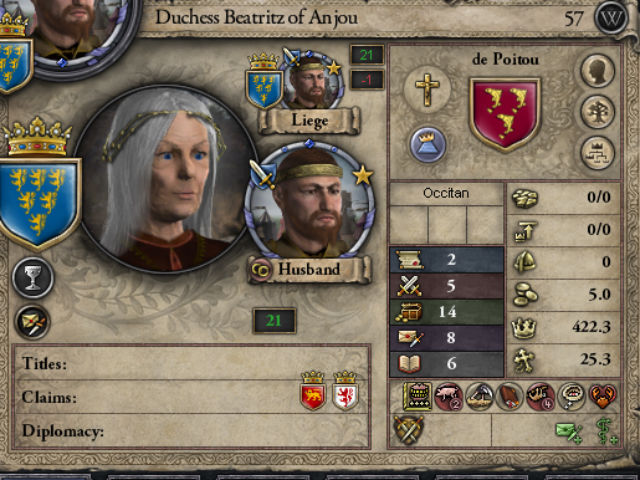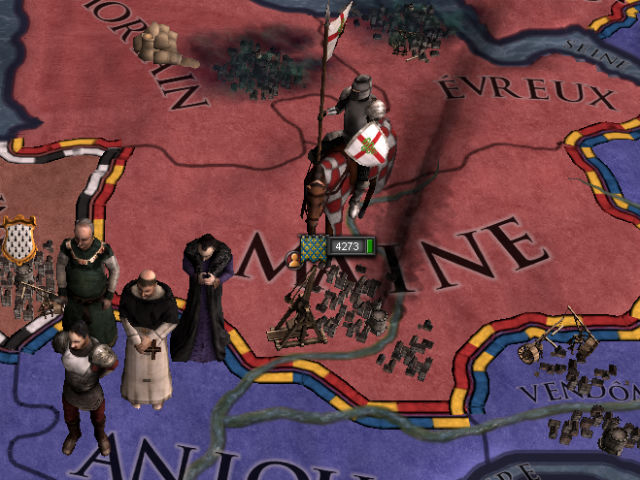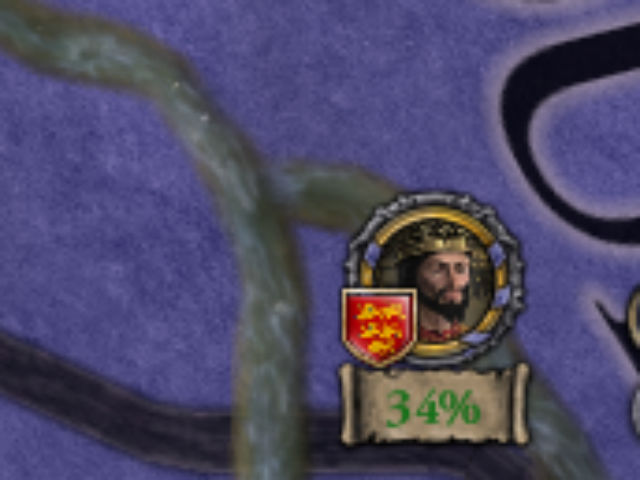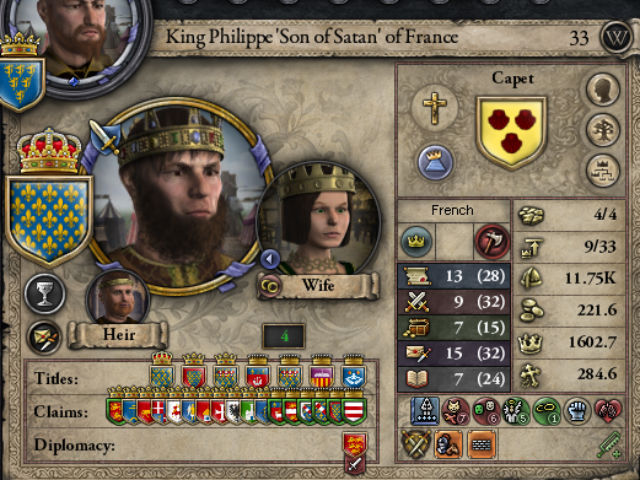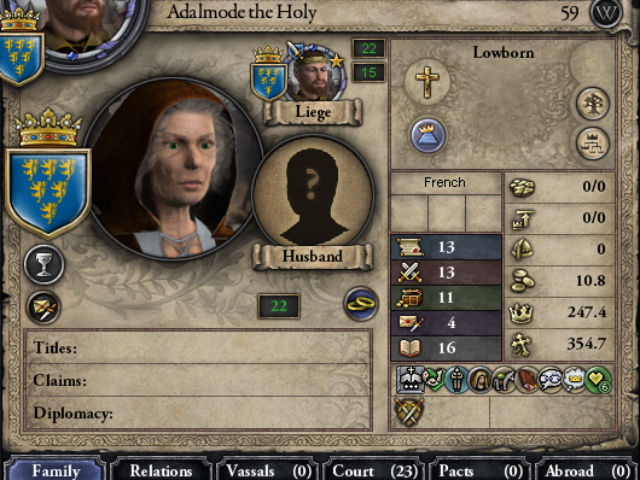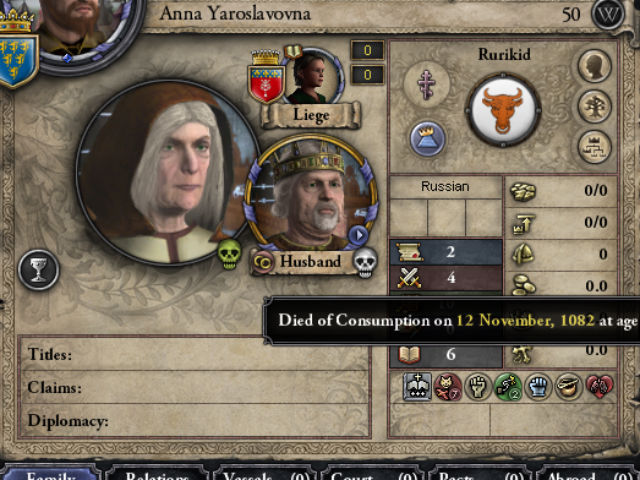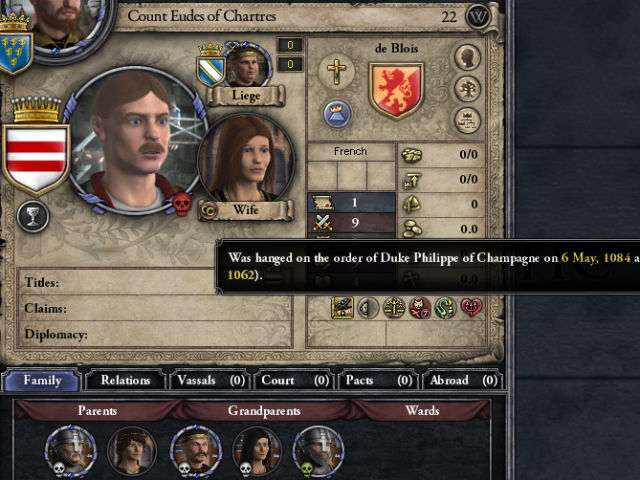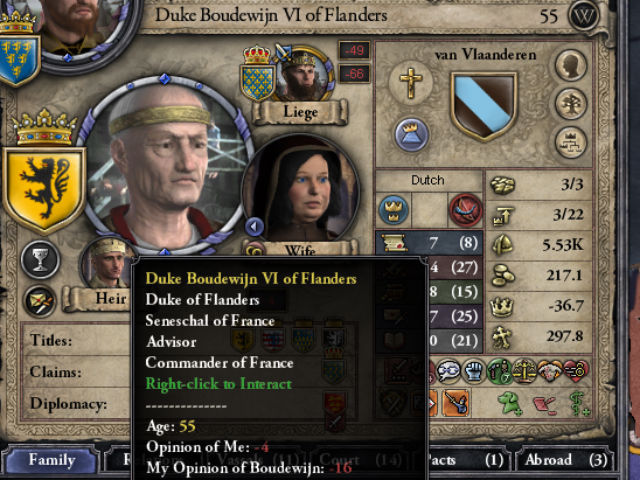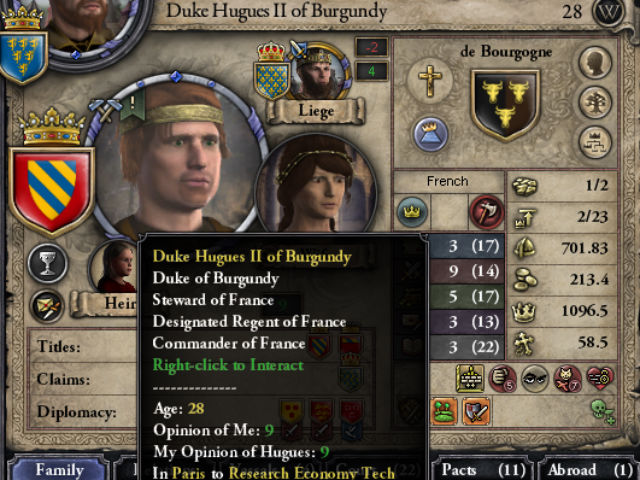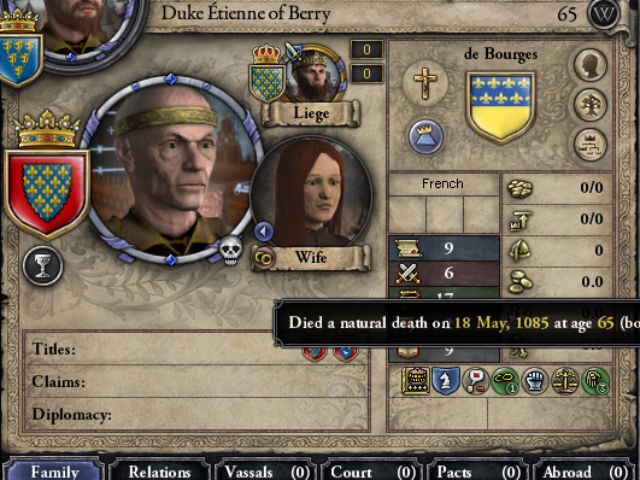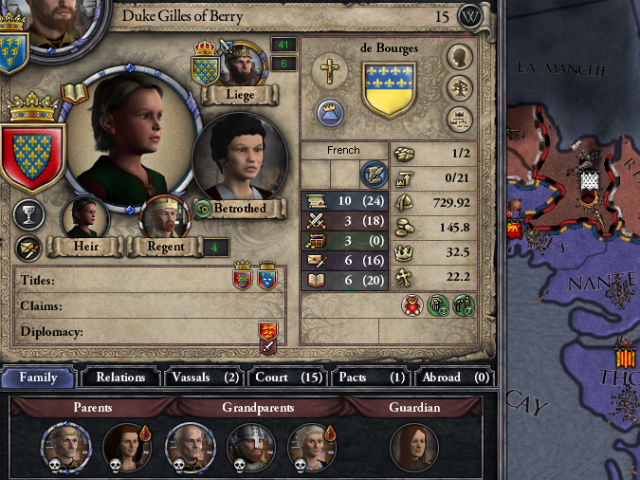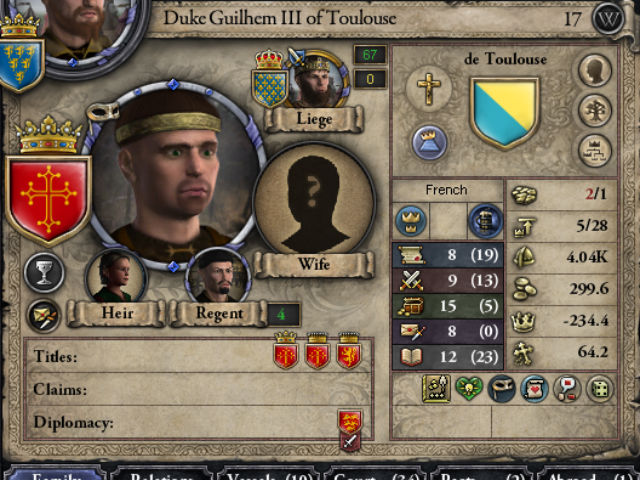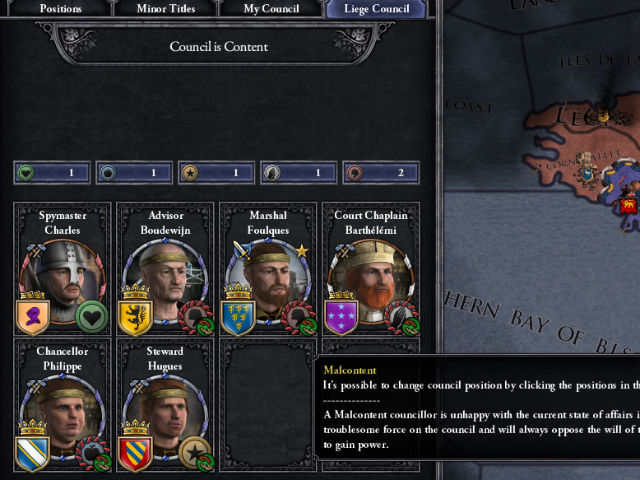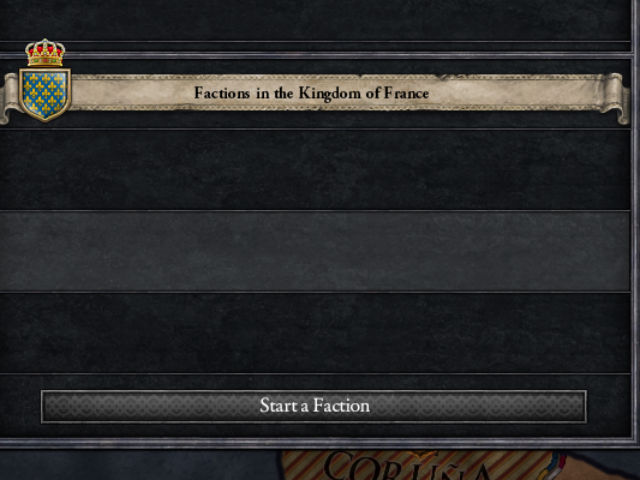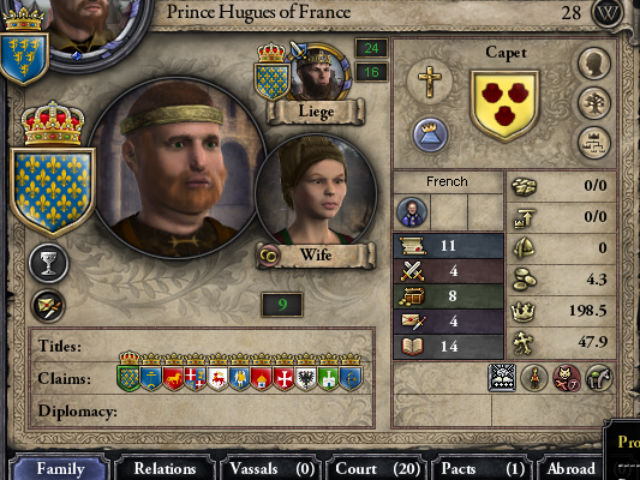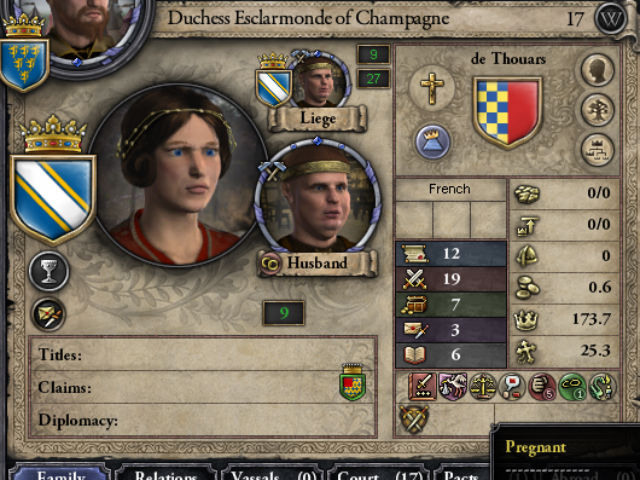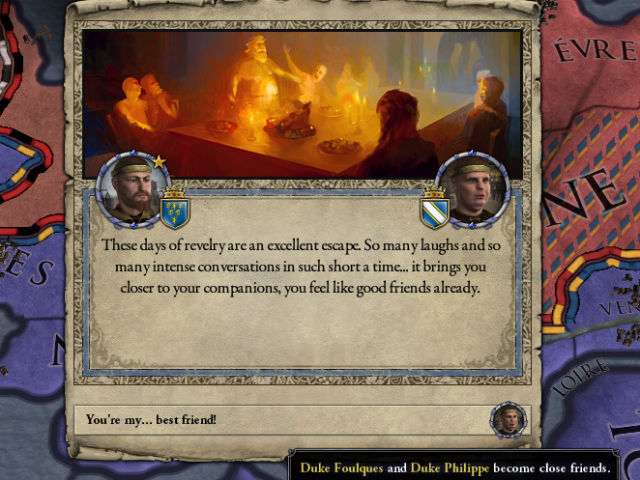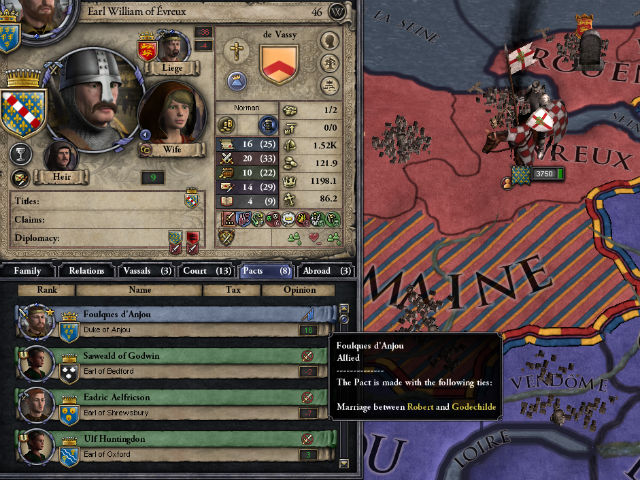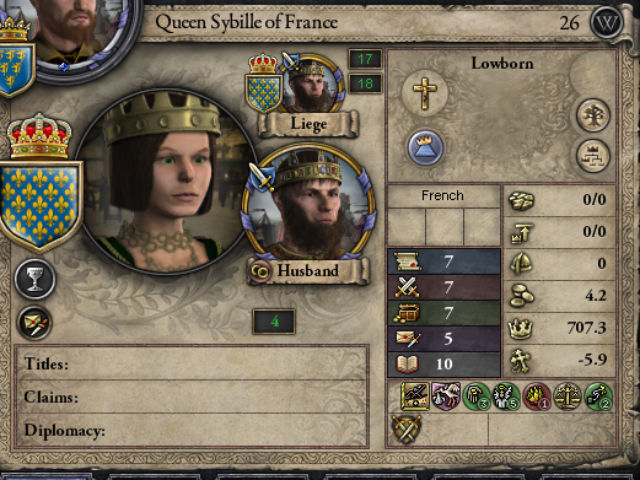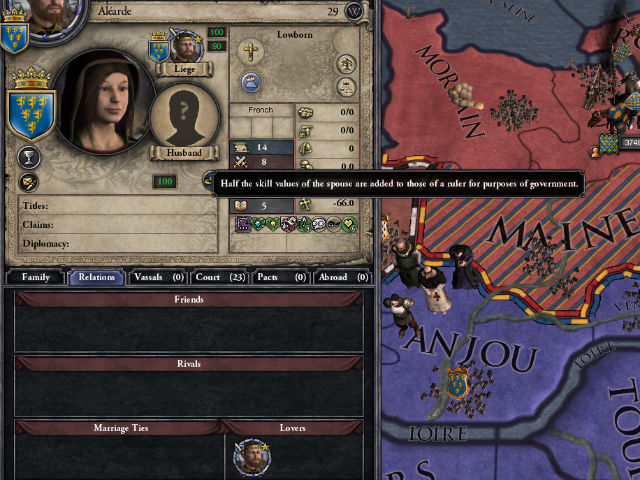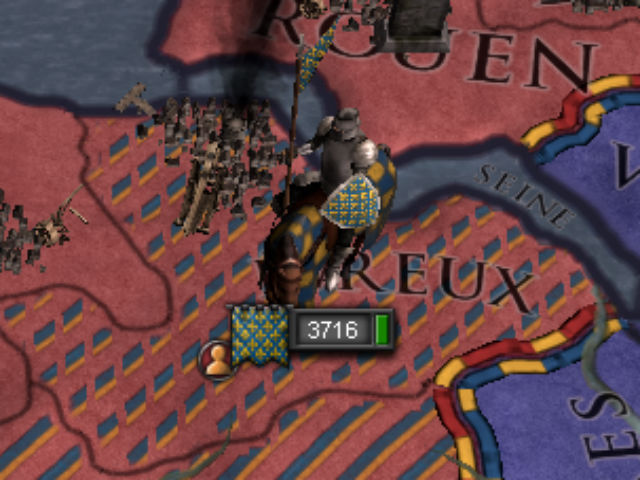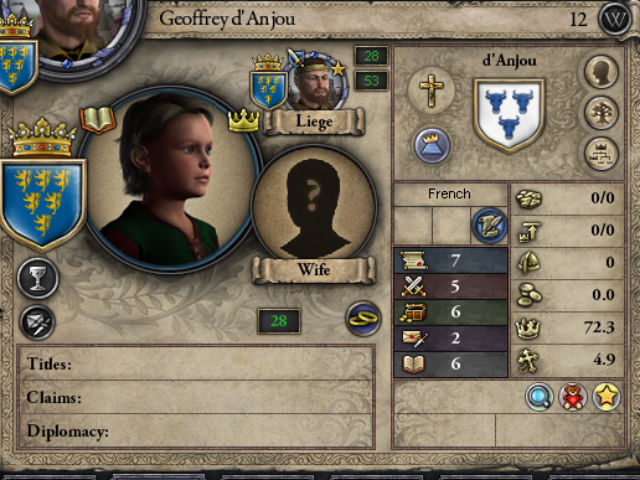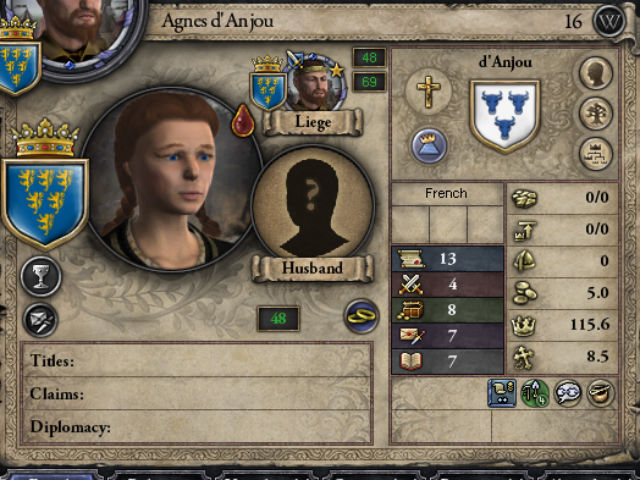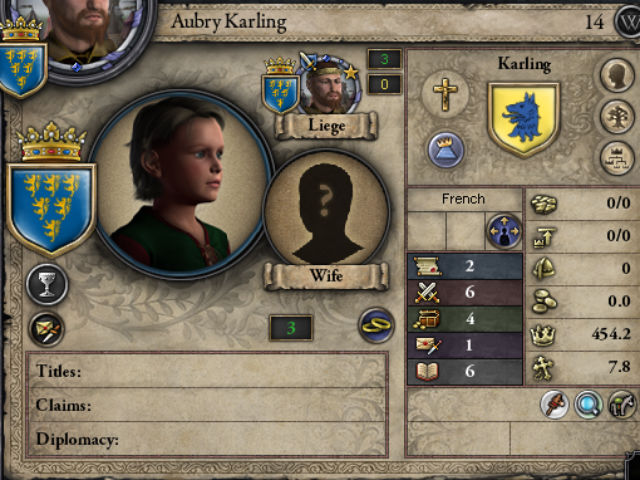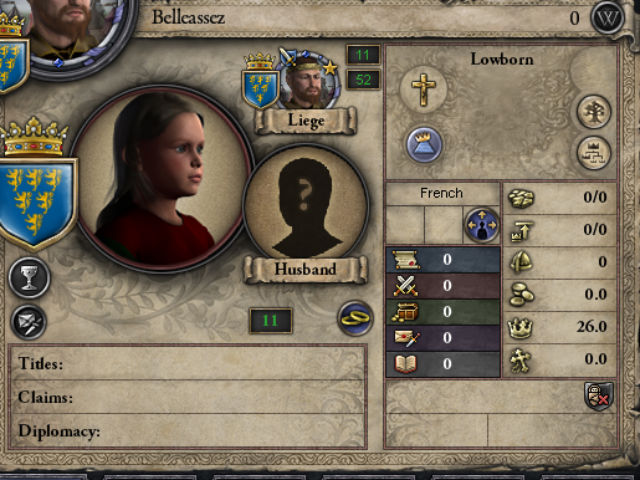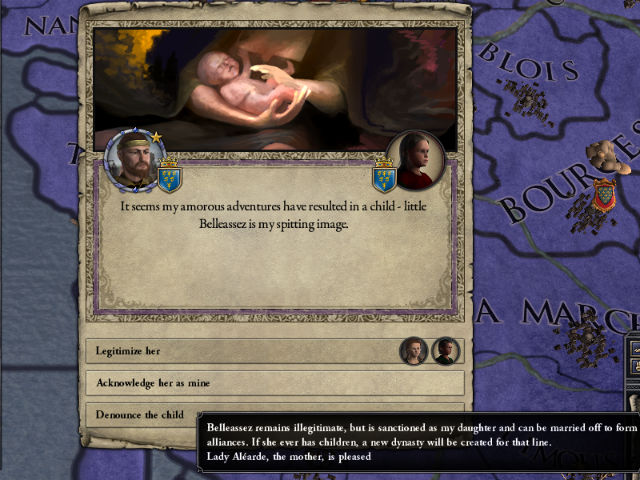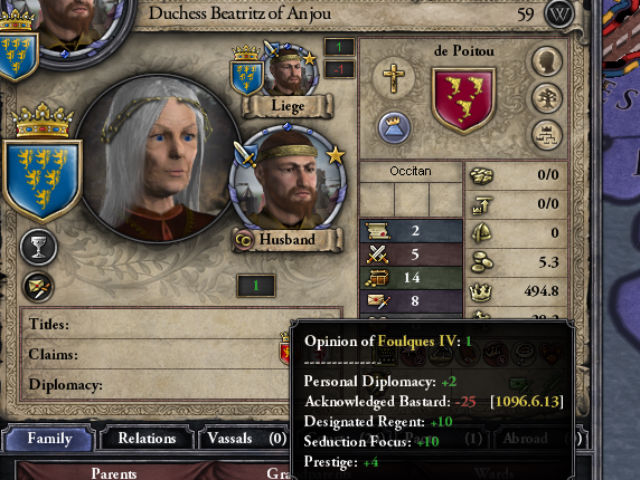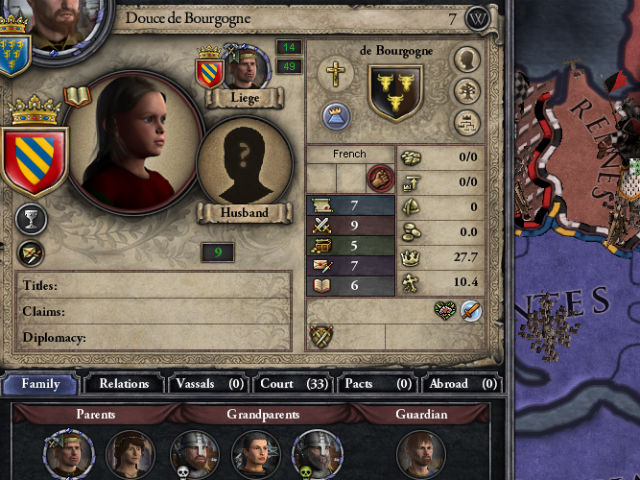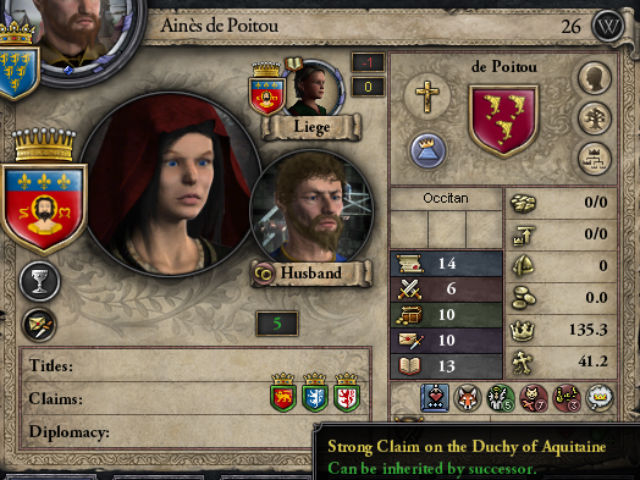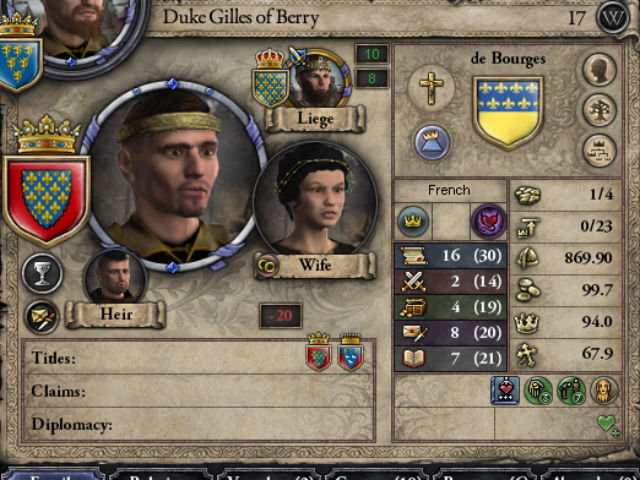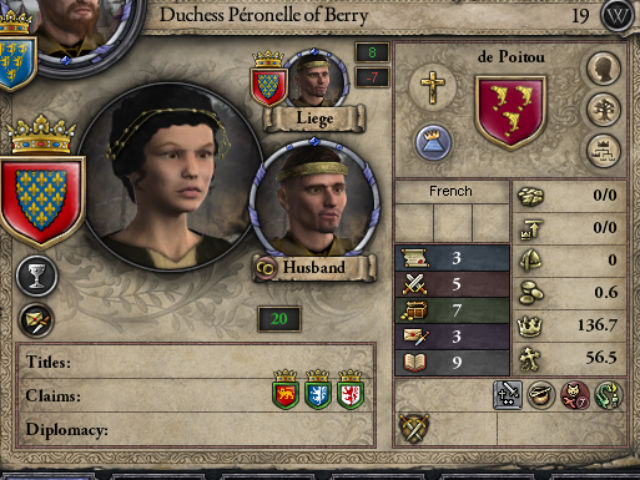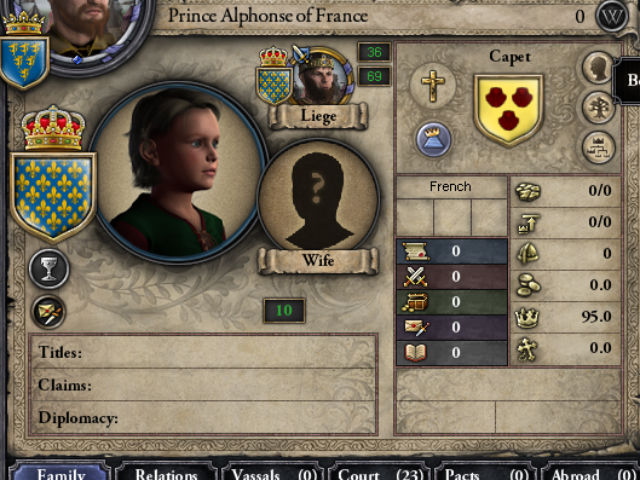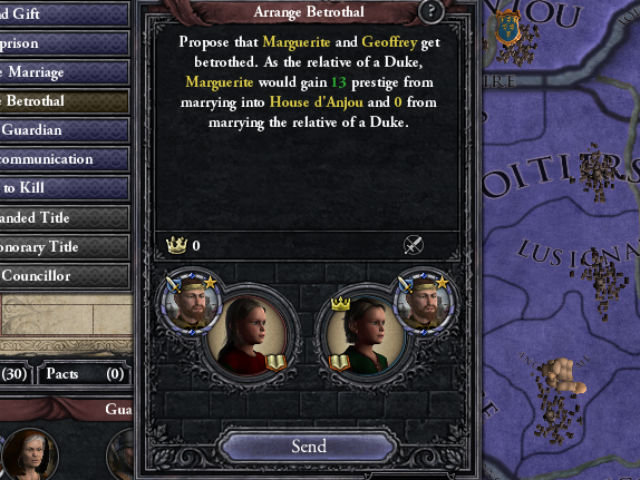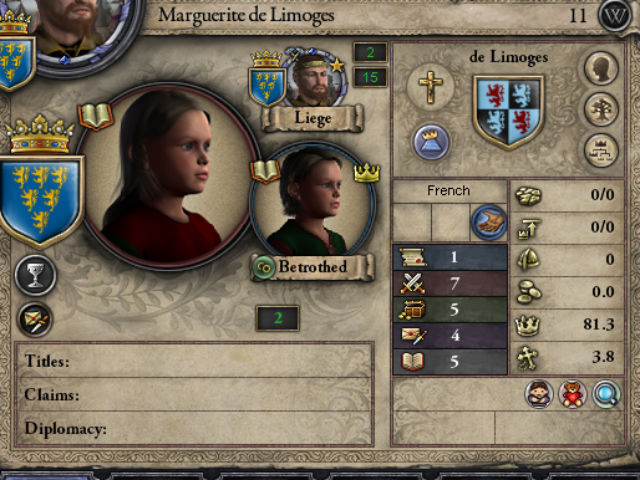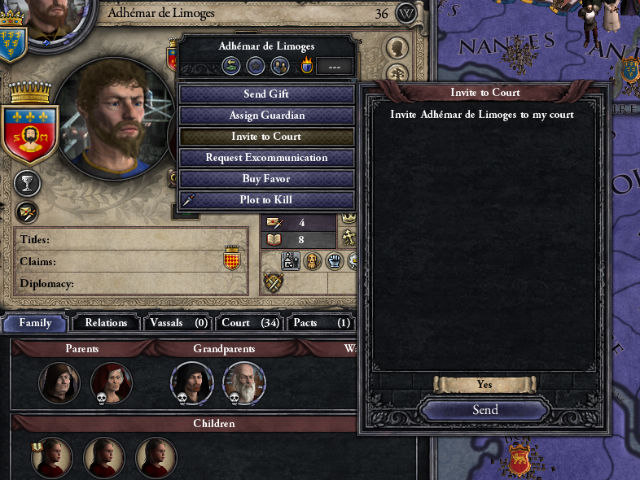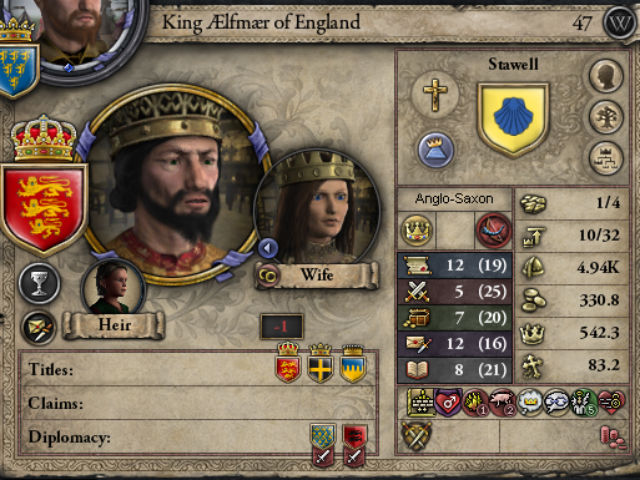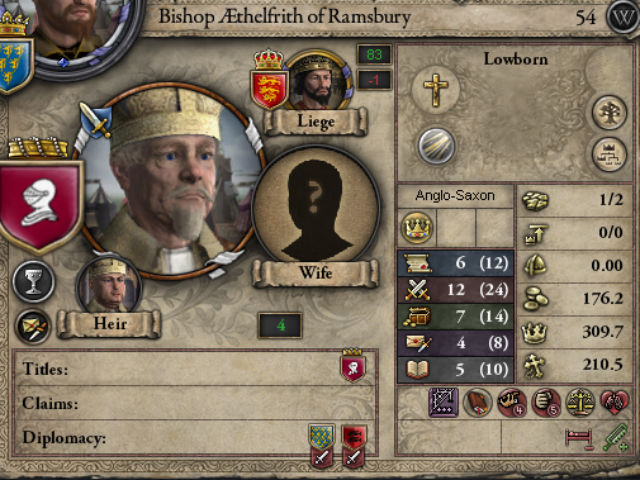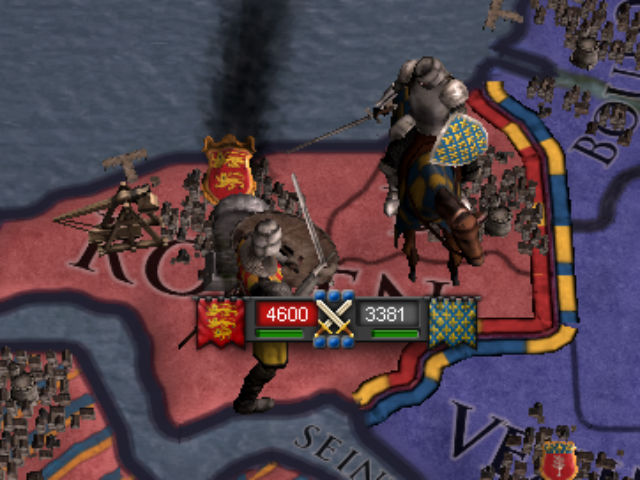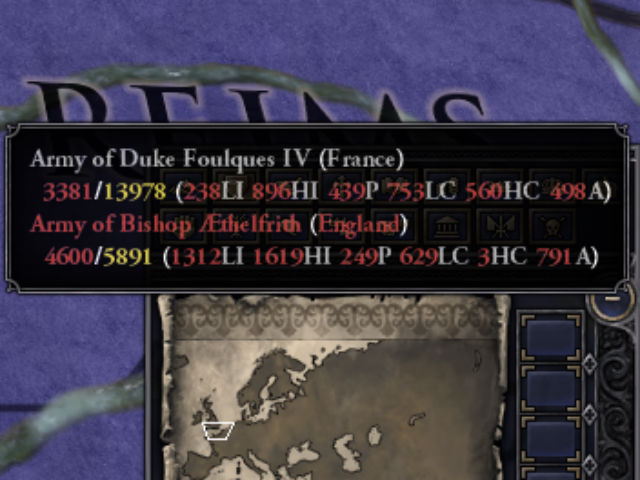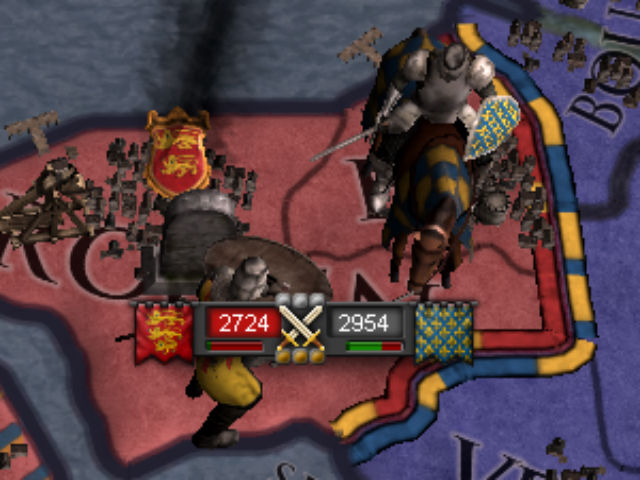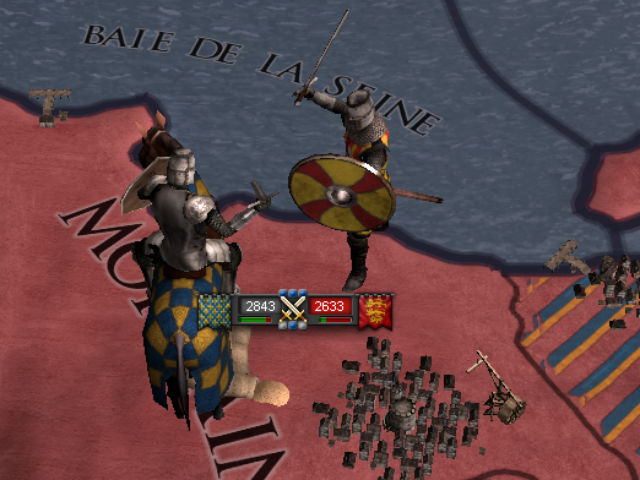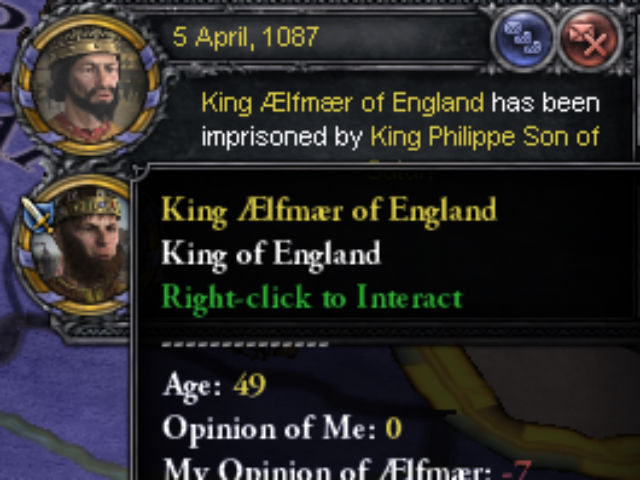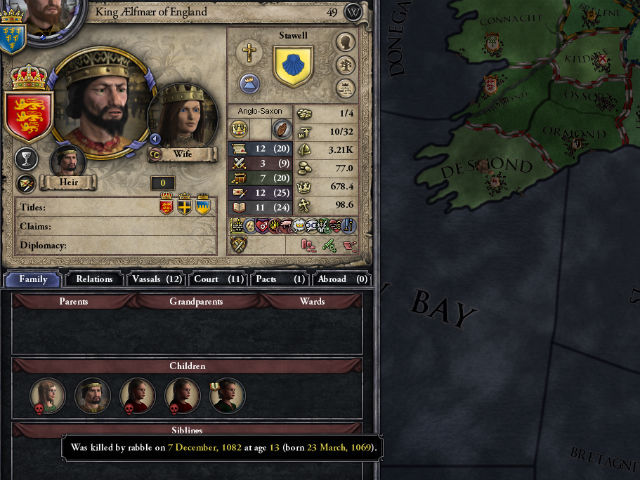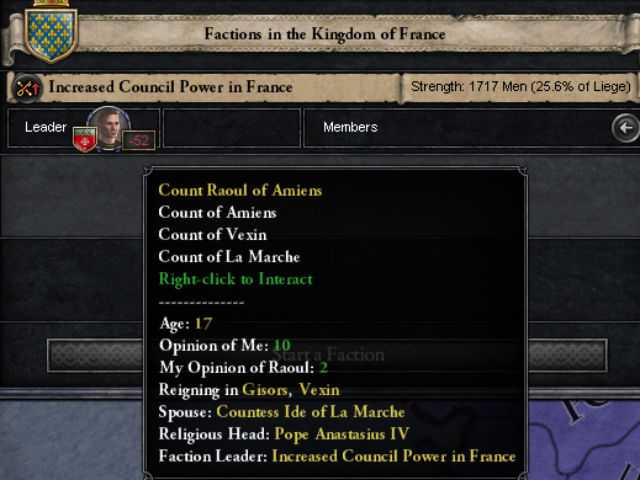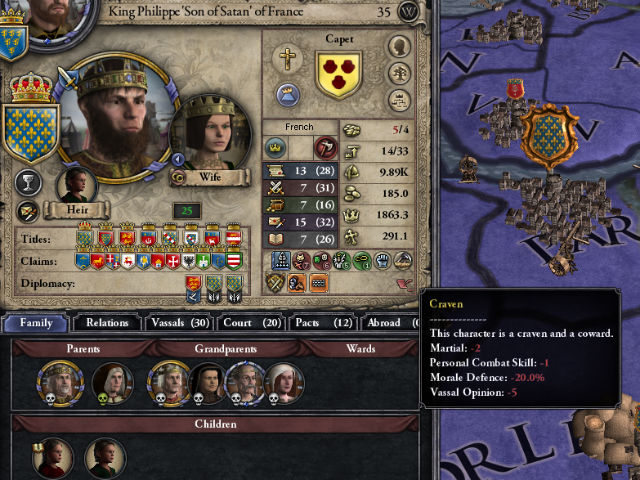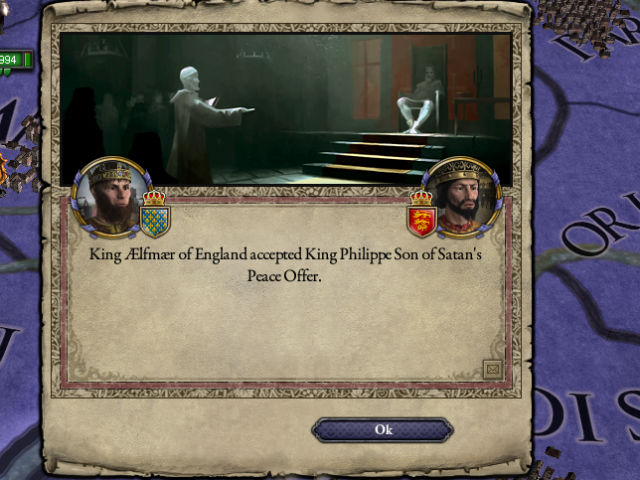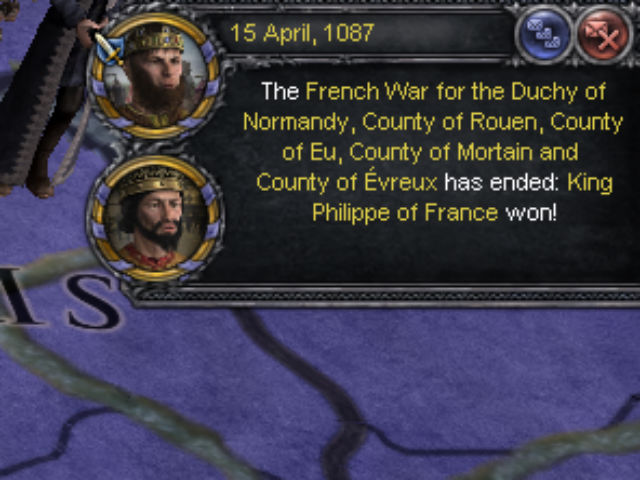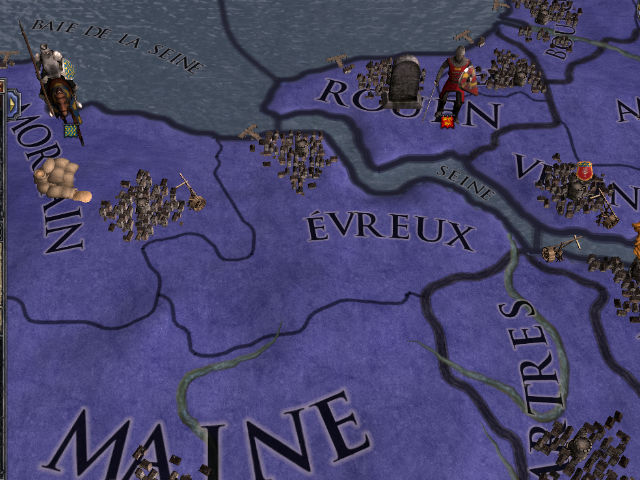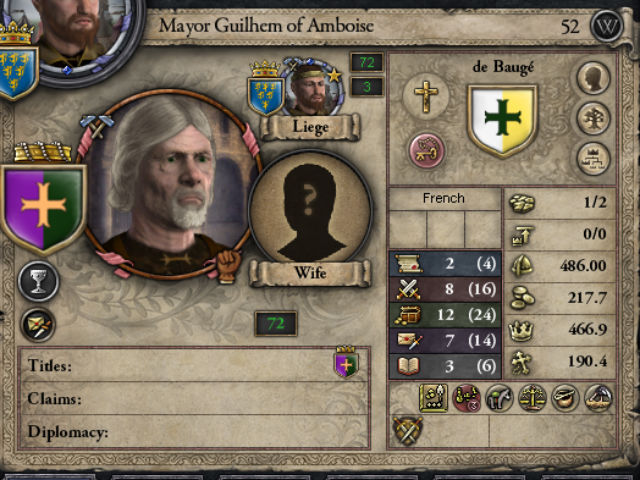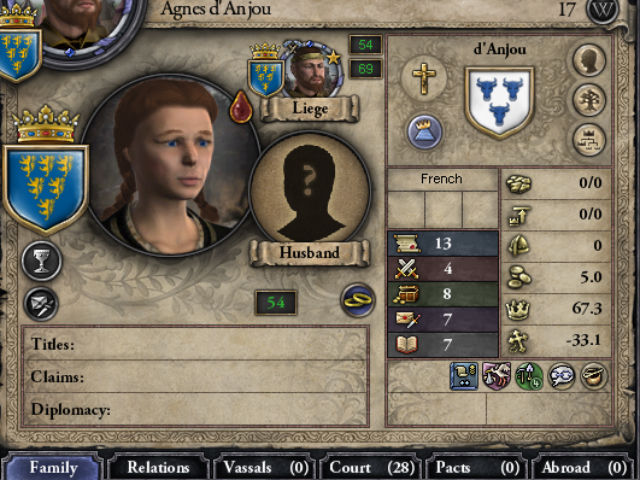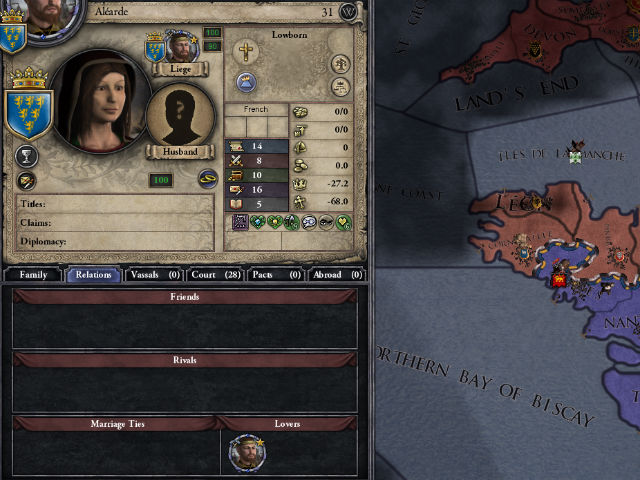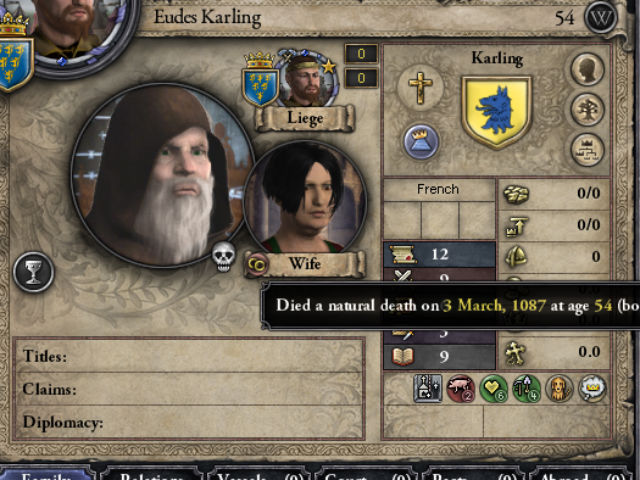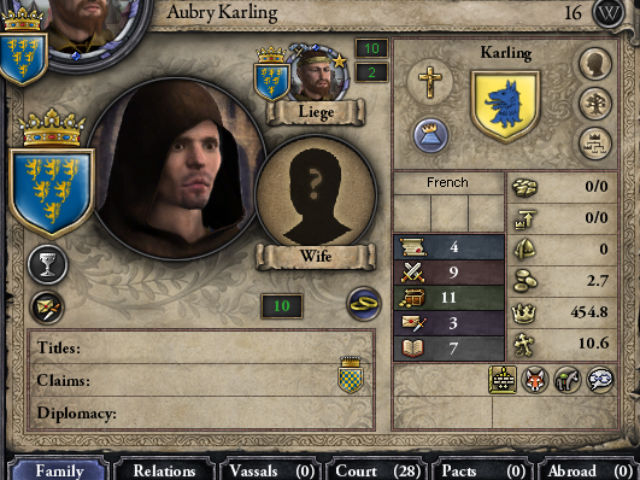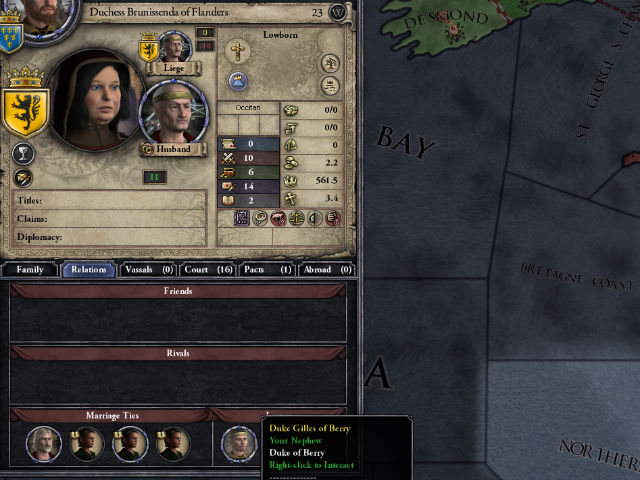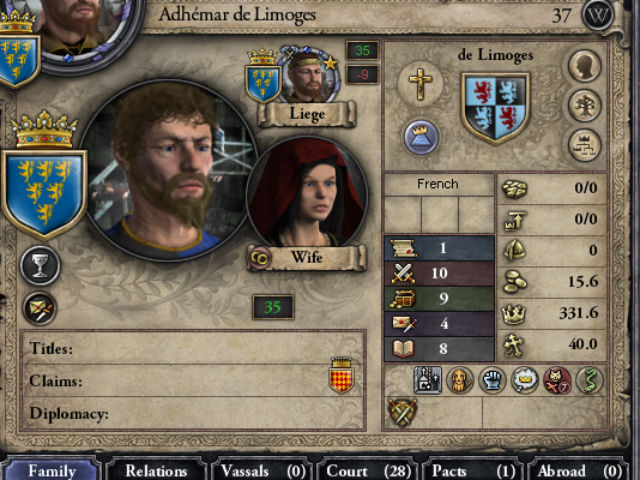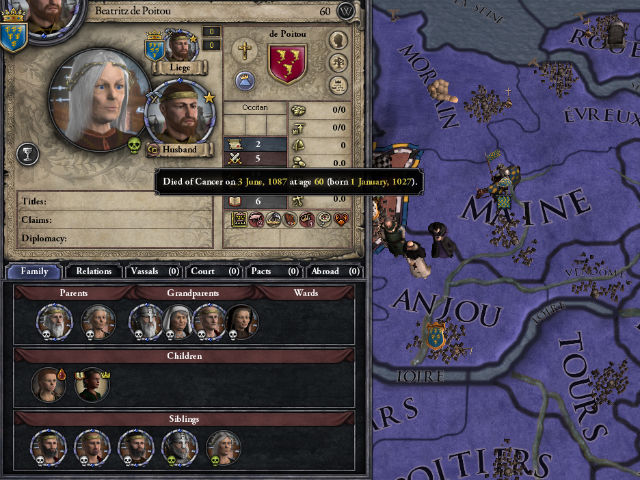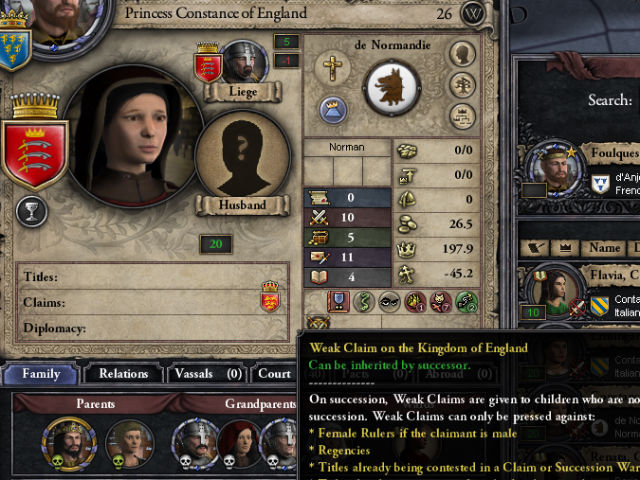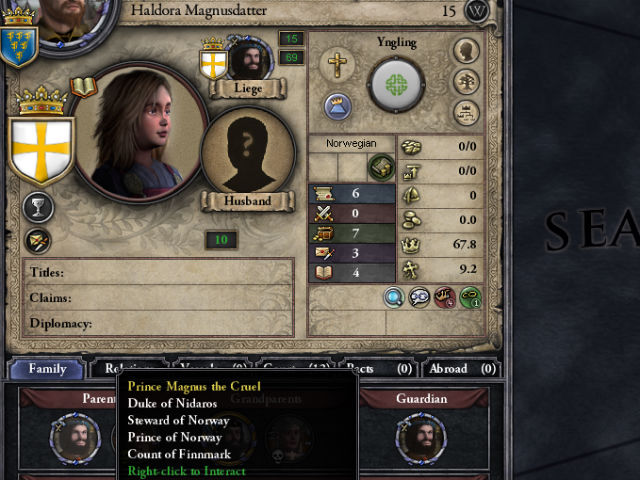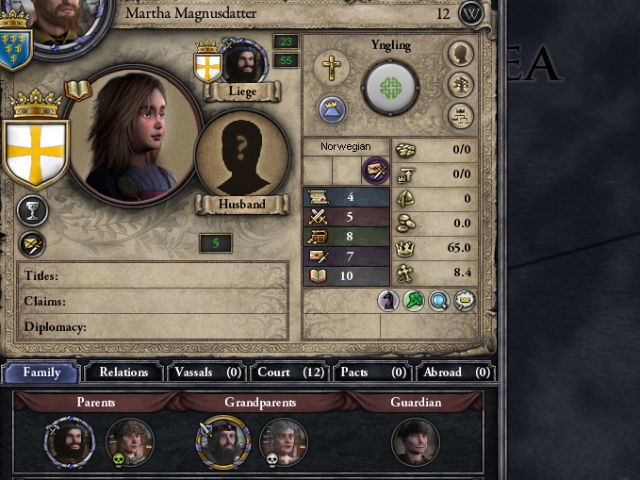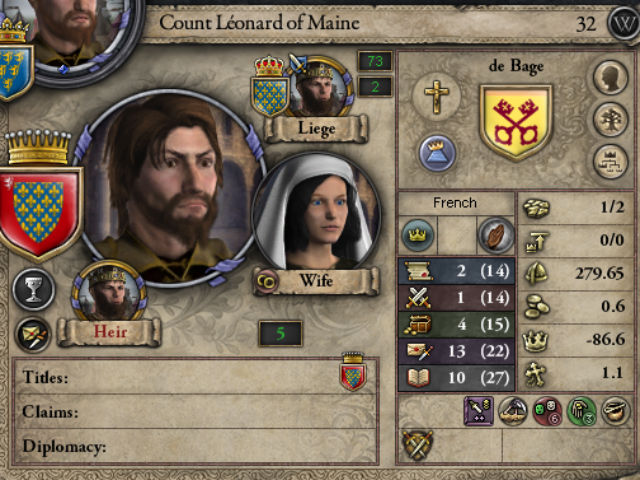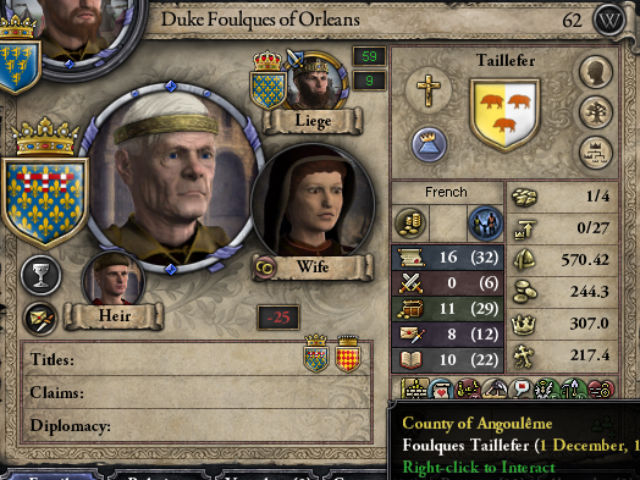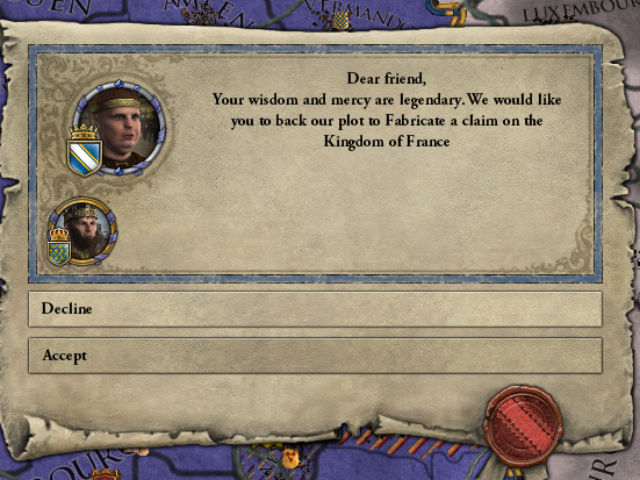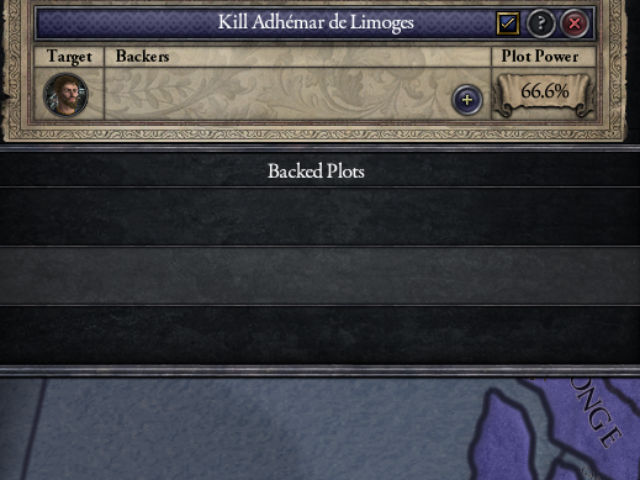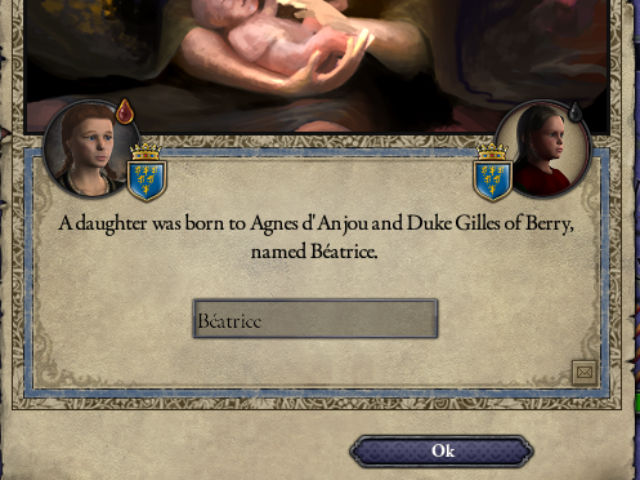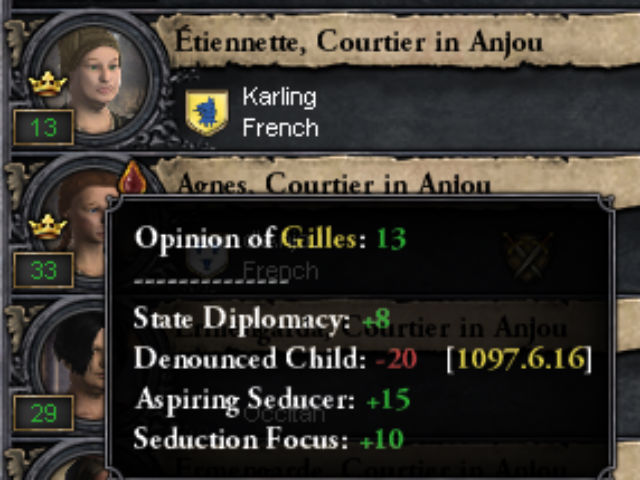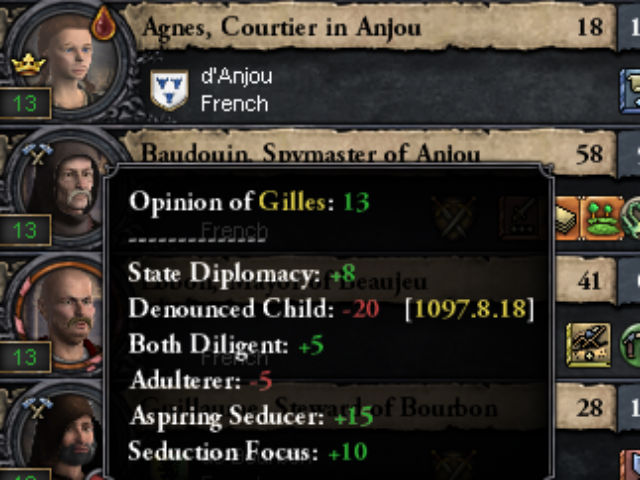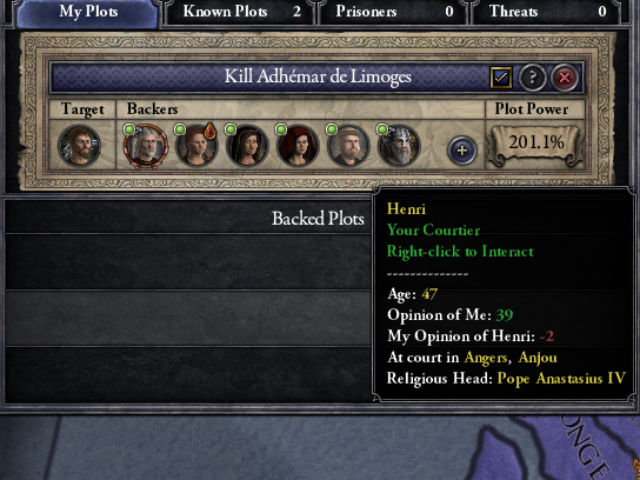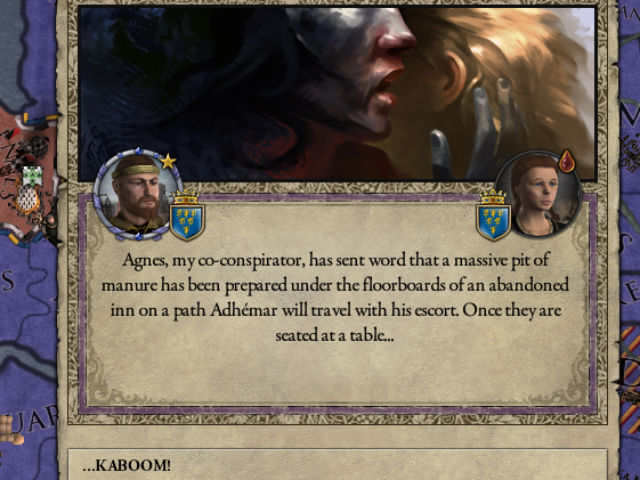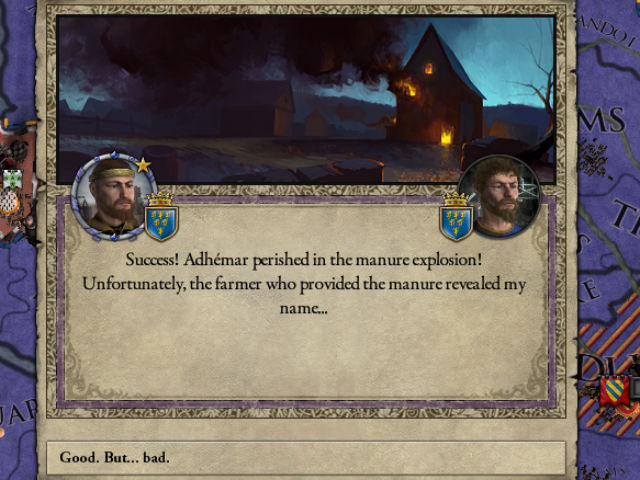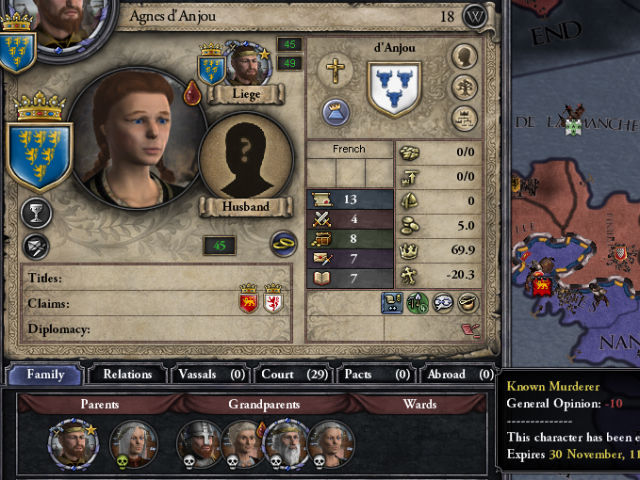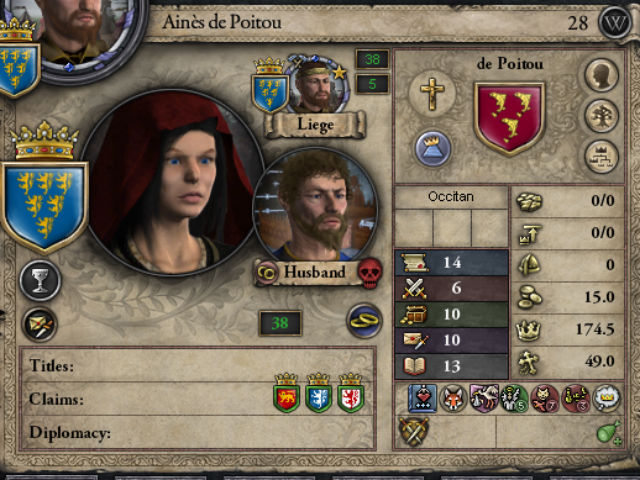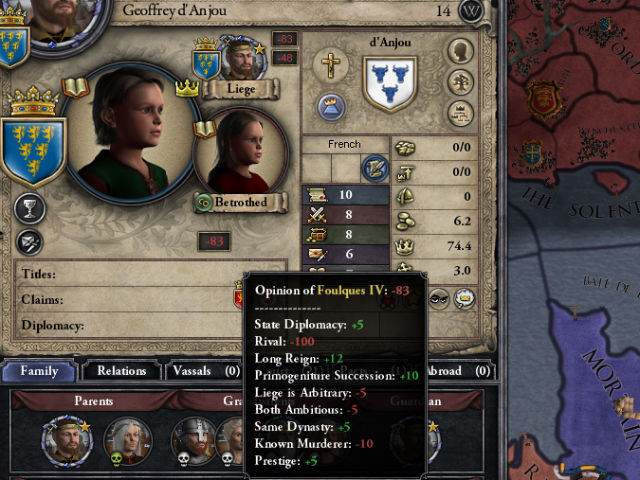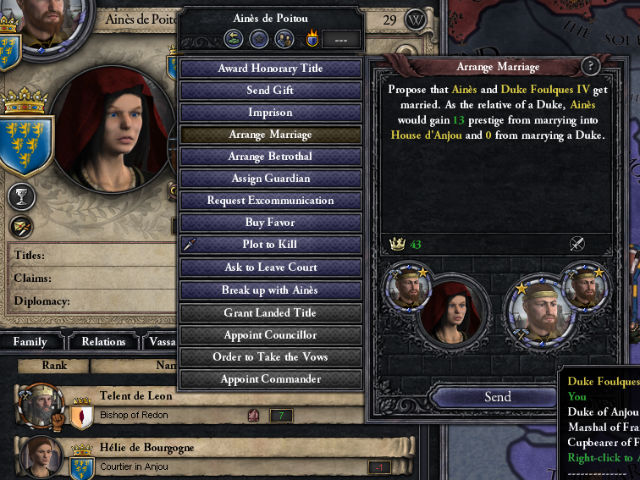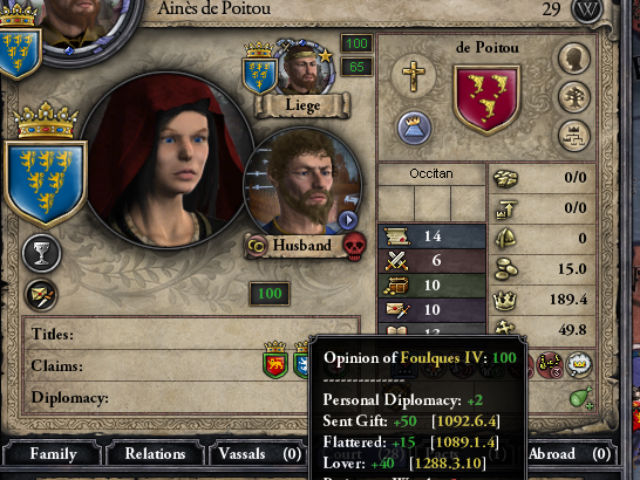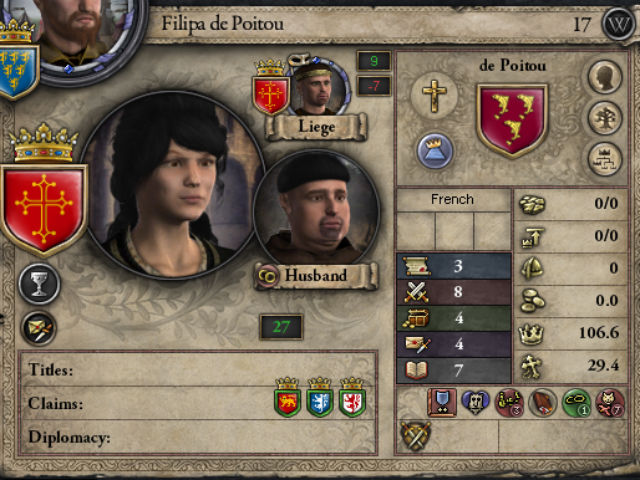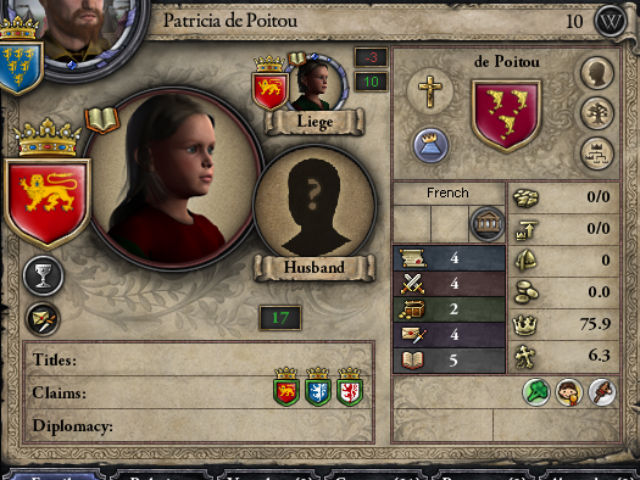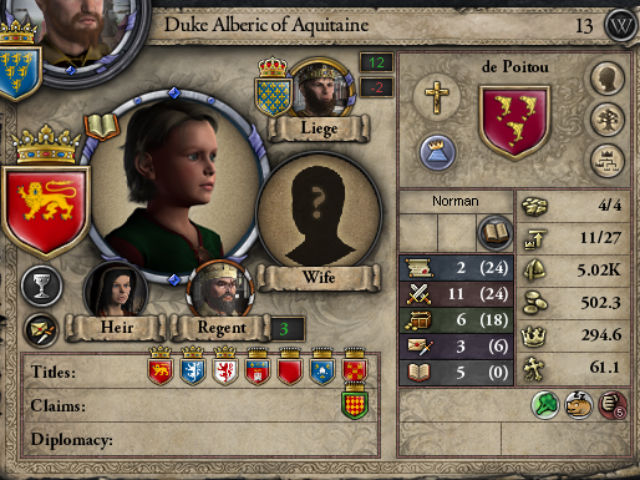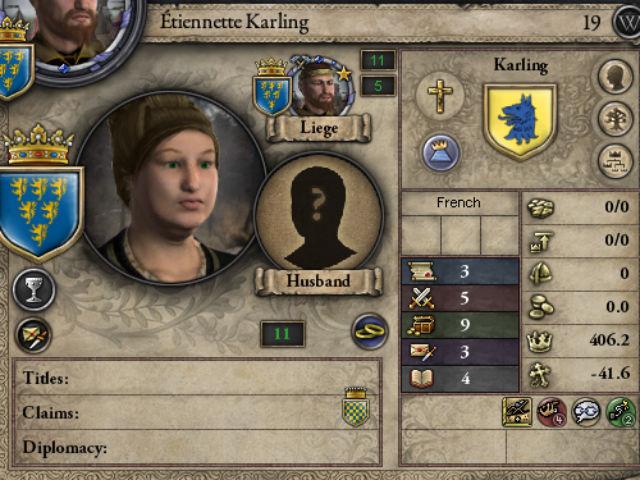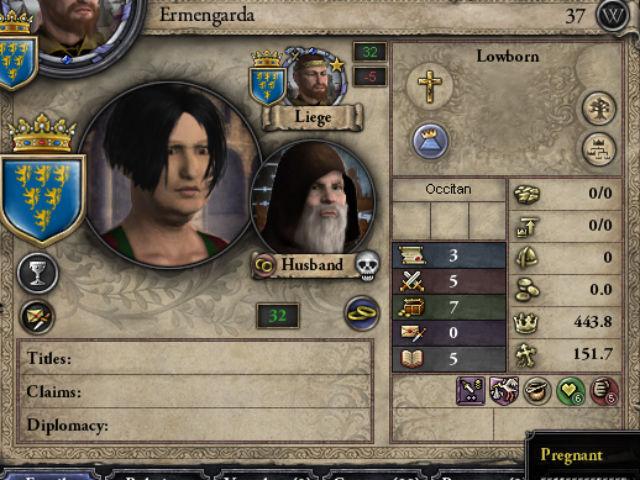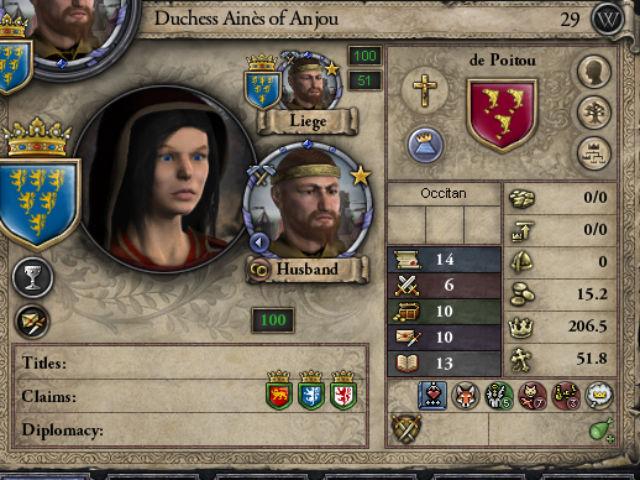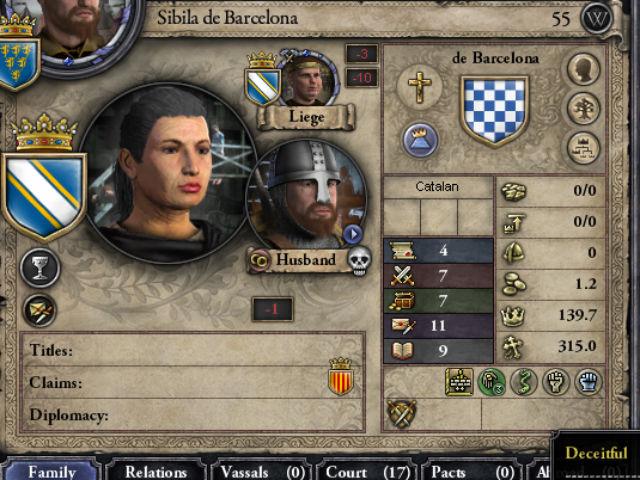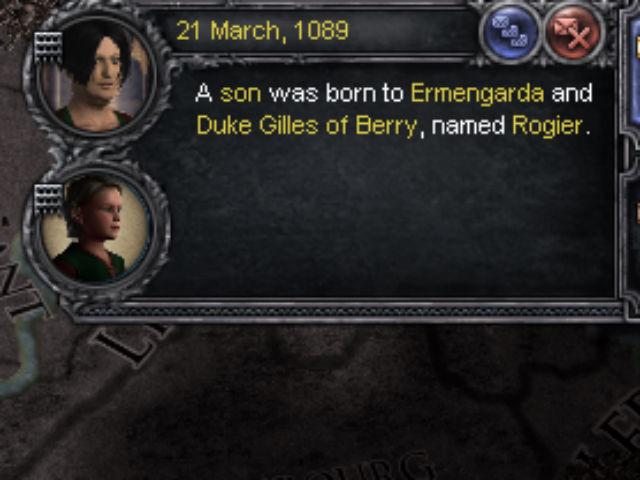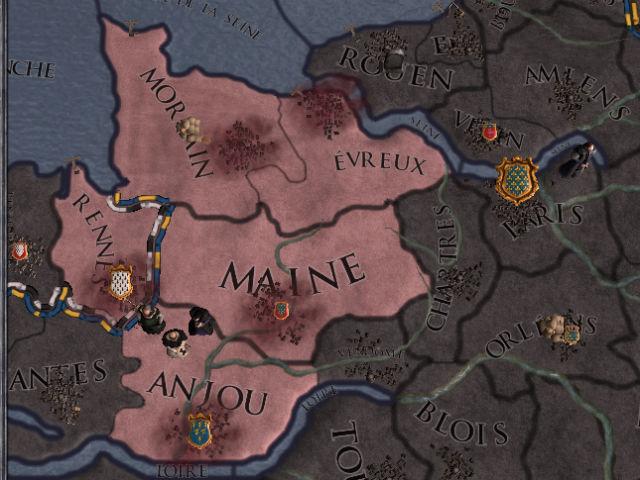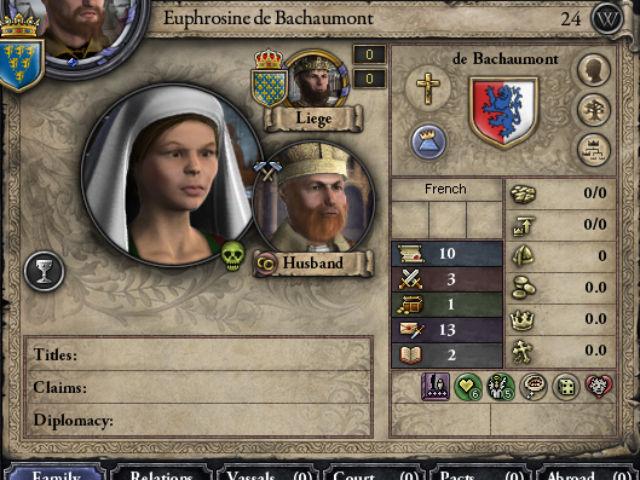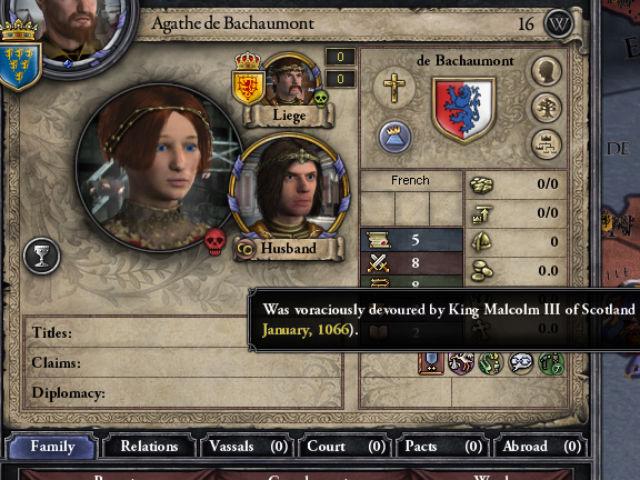Before Plantagenet- Chapter 41
September 1083 - Anjou, France
Foulques looked at her with some apprehension.
She did not appear as she should. After all, he had grown used to Beatritz’s more corpulent form, her gluttony, slothfulness, combined with birthing two children had conspiring to make her grow fat in her advancing years.
The duchess was certainly not thin now, but she had shrunken quite a bit over the last few months. Her dresses hung much looser off her frame - her skin sagged a bit as well. Her hair, completely white, now thinned. Her eyes were a bit sunken.
Yes, it should not have been unexpected, given she was 57 years. But for the first time since he had married her, Foulques could not help and see Beatritz as old.
And for some reason, it frightened him.
“You do not need to attend this meeting,” he told her. “It is important you rest.”
“I have rested for months,” Beatritz said, her voice raspy.
“Because you needed it,” Foulques said. “Adalmode believes that flu nearly took you. Given your age…”
Beatritz’s gaze fixed on him. For a moment, he could see the strength of will return to her.
“She also believes I am through the worst. And yes, I am old,” Beatritz said. “So old that I should lay here and wait for death to arrive?”
“I do not wish for him to arrive at all,” Foulques said. “Which is why I suggest as I do.”
“He is coming regardless,” Beatritz said. “But I do not feel he is coming today. Which is why I rise. And because you plan war. And if I am to serve as regent once more, I must be there at your council meeting.”
Foulques smiled and kissed her forehead. Then he helped her to her feet.
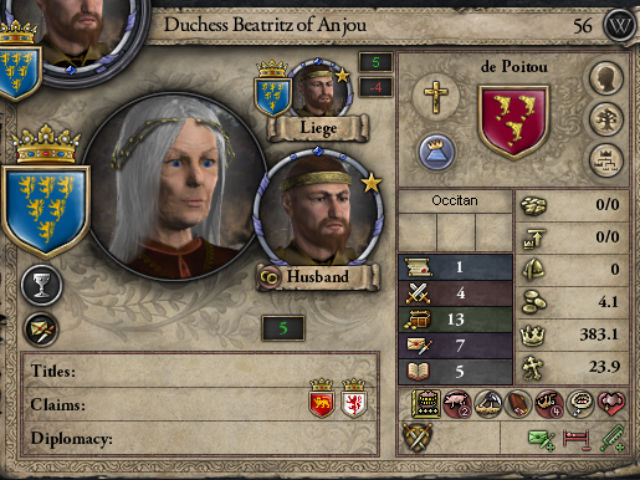
Slowly, they made their way to Foulques’ strategy hall. They walked arm and arm - it was deception of course - Beatritz needed the assistance to move. It was hardly the first time either but the pair had grown proficient at hiding her weakness. Or at least that is what Foulques believed - he had not had the will to ask Alearde what others truly thought of the duchess’ condition.
Upon arriving in the hall, Beatritz pulled away from her husband and motioned for him to move forward without her. With some caution he did, but she slowly trudged in behind, in full sight of the other councilors, who were gathered for the meeting. They lowered their heads as the pair entered. She managed to make it to a chair, and sat down.
“Let us not waste any time,” Foulques said as he arrived at the long table, the map still laid on it. It had changed much over the years - what with the expansion into Vendome and Nantes. And now, Foulques aimed to alter it once more.
“Has Duke Guilhem responded to our overtures?” Foulques asked.
Godfrey nodded. “He seems favorable, my lord. It appears he understands your reasoning for departing the siege of Tudela and said he prays his sister returns to good health soon.”
“You may pass along to my brother that I am in health,” Beatritz said. “And that I thank him for his prayers.”
Godfrey smirked and nodded. Foulques did the same.
In truth, he doubted Guilhem was even needed. Countess Sulgwen, by herself, stood no chance against Anjou. But with the war in Navarre now done, and Foulques still frustrated by what a waste of time it proved to be, he was not going to let Guilhem off easy in his obligations.
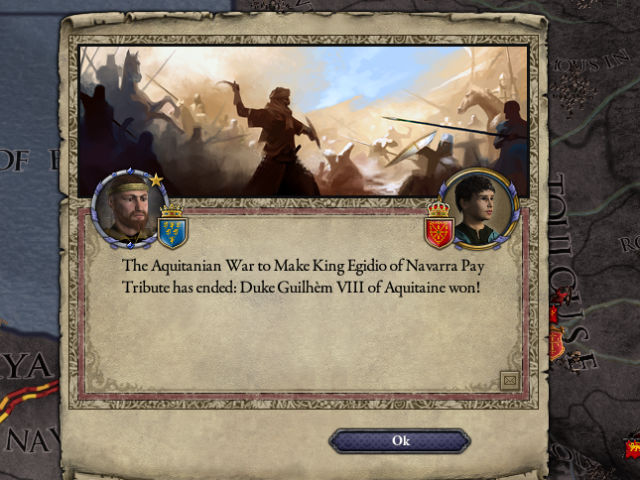
And besides, Foulques thought to himself, how much longer will I be able to call on the old man anyway?
“Do we have wish to summon the Count of Charolais? Or Evreux?” steward Guilhem asked.
“No,” Foulques said. “They will not be needed.”
With William of Evreux part of the war with Philippe, Foulques doubted he would answer the call anyway. And Foulques had grown a bit suspicious of the Count of Charolais, given the rumors that his murder of the Duke of Toulouse was done at the behest of Duke Hugues.
I do not need Hugues meddling in something that should be straightforward, Foulques thought.
“What of King Philippe?” Foulques asked Godfrey. “Has he been informed?”
“Yes, my lord,” Godfrey said. “The king passes along his approval, and his best wishes in your adventure. He says he has no doubt you will have little issue in dealing with a child.”
Foulques narrowed his gaze. Always a biting comment from the king. He imagined Philippe passing along the remark, full-on smile plastered from ear to ear.
Perhaps he had said the same to Duke Guilhem’s emissaries when he left to attack Navarre, though Foulques doubted the king would have said it to his face for fear it might be bitten off on the next full moon.
But then, perhaps Philippe had right to be confident. His war with England continued to do well despite the setback of losing Duke Etienne of Champagne to smallpox, who was succeeded in his duchy by his young brother Philipp.
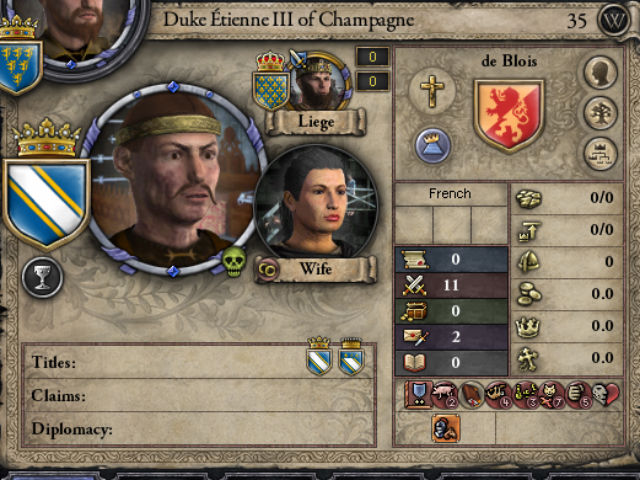
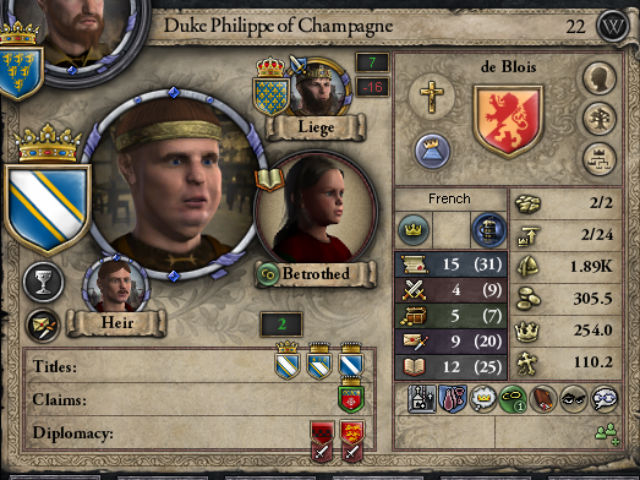
In his place rode the Duke of Berry, who had won Philippe a smashing victory over King Godwine’s newly assembled force when the armies met in Rouen.
The result was not only victory for the Franks, but Godwine himself had fallen in battle, attempting to rally his men. The English were once more in disarray, and their armies forced to fall back and regroup.
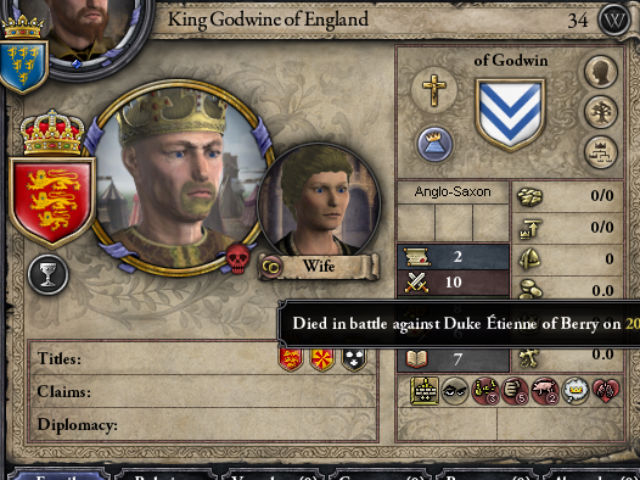
Foulques had heard rumors Robert of Normandy demanded to be installed king - arguing his armies could turn the tide back toward England’s favor.
The Saxon dukes would not hear him.
Instead, they had recently chosen Aelfmaer, who was the Duke of Hwicce… and had but one county to his name. Supposedly, Robert had stormed from the gathering, swearing England would be ruined by their stubbornness.
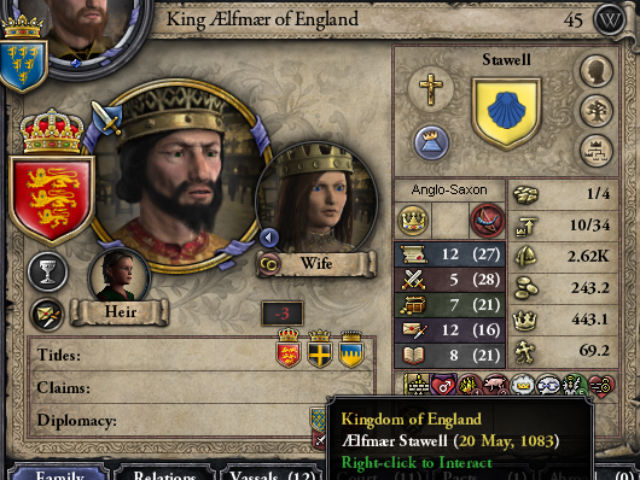
More than likely, it would be Robert ruined, Foulques knew, as he remembered Philippe’s desire to take Normandy for his own demesne.
“Then we are ready to proceed,” Foulques said. “All in favor of the motion to declare war upon Countess Sulgwen and rightfully add the county of Vannes to Anjou?”
All of the council raised their hands. Times had certainly changed from the days of Andre and his obstinance.

“It is settled,” Foulques said. “Leon, raise the levies. And as before, Duchess Beatritz will resume her role as regent in my absence. Should she be unable to perform her duties, Mayor Guilhem will assist her.”
The council nodded and Foulques ended the meeting.
There was one more order of business however, one that required the spymaster Baudouin, and greater privacy than the strategy hall could provide. Thus a few minutes later, Foulques and Beatritz had relocated to a small chamber, where the spymaster soon joined him.
“I assume,” Baudouin began, “this is over the matter of Mayor Uther of Guerande?”
Foulques nodded. The Breton mayor of the town in Nantes opposed his efforts to change the succession law in the duchy. He was but the only one who did - well, aside from Bishop Telent, who remained in the dungeons.
“We cannot have the progress of Anjou held up by an obstinate Breton,” Beatritz said. “If he cannot be made to see reason, he must be dealt with.”
Baudouin nodded. “I have a plan afoot, my lord and lady. Steward Guilhem and Renaud of Saumur will invite him to a small council of mayors. There, they and Alearde will take care of the matter.”
“Alearde?” Foulques asked. “Are you certain that is wise?”
“She is quite good at such matters,” Baudouin said. "Easy on the eye, but very skilled at what needs to be done."
“I recommended her,” Beatritz said. “We can afford no failures in this and must send our best. For the sake of our children, to ensure they are as strong as possible.”
Foulques lowered her gaze. He could not rebut such an argument. He loved Alearde yes, but his children came first.
“Take care of it as you see fit,” Foulques said.
Baudouin nodded. He then slipped from the room, leaving Foulques and Beatritz alone.
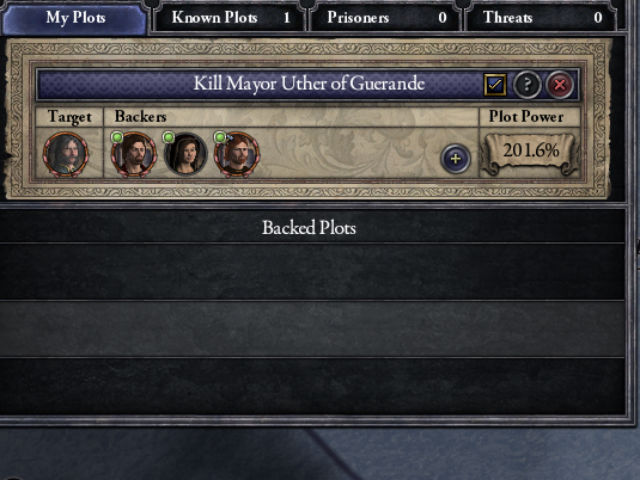
“You have been busy,” he told her. “Even while ill. It is impressive.”
Beatritz gave him a smile. “I have worked hard for this. I would not squander it.”
“No,” Foulques said. “You would not.”
“There is one more matter,” Beatritz said. “My niece, Aines writes me.”
Foulques felt his stomach clench for a moment.
“What did she say?”
“She wished me good health,” Beatritz said.
“Sweet girl, she is,” Foulques replied.
Beatritz laughed. “Yes, and after she finished sending me her prayers, she inquired about the availability of young Geoffrey. She made mention of her daughter Margaurite as a potential match.”
Foulques nodded. “She did the same when I met her in Bordeaux.”
“She mentioned as much,” Beatritz said. “And that you were not opposed.”
“I have done little thinking on such matters,” Foulques said.
“I have noticed,” Beatritz replied. “As our daughter remains without a marriage betrothal.”
“I am in little rush to send her away,” Foulques said. “I have seen the mistake your brother made with Aines. I look for a good match.”
“No, you do not look at all,” Beatritz said. “But if you like, I will seek unions for both our children.”
“Such things will be taxing,” Foulques said. “I do not wish for you to push yourself. Given your health, running the duchy will be enough.”
“I would do much for my children, husband,” Beatritz said. “It is no bother.”
Foulques shook his head. But he knew full well she would go about exploring things regardless of his approval. He may as well do his best to limit it, lest she try to overreach herself.
“You may explore,” Foulques said. “But that is all you shall do. I do not want even a negotiation to begin without me present.”
“Of course, husband,” Beatritz said. “I would not think of making such a big decision without your consent on the matter.”
No, you would merely make the decision and then convince me it was my idea, Foulques thought. But, he could not bring himself to be angry at the moment. Looking at her brought again the reality their time together was growing short.
And despite his feelings at different points in the marriage, it was not something he looked forward to.
September 1083 - Anjou, France
Foulques looked at her with some apprehension.
She did not appear as she should. After all, he had grown used to Beatritz’s more corpulent form, her gluttony, slothfulness, combined with birthing two children had conspiring to make her grow fat in her advancing years.
The duchess was certainly not thin now, but she had shrunken quite a bit over the last few months. Her dresses hung much looser off her frame - her skin sagged a bit as well. Her hair, completely white, now thinned. Her eyes were a bit sunken.
Yes, it should not have been unexpected, given she was 57 years. But for the first time since he had married her, Foulques could not help and see Beatritz as old.
And for some reason, it frightened him.
“You do not need to attend this meeting,” he told her. “It is important you rest.”
“I have rested for months,” Beatritz said, her voice raspy.
“Because you needed it,” Foulques said. “Adalmode believes that flu nearly took you. Given your age…”
Beatritz’s gaze fixed on him. For a moment, he could see the strength of will return to her.
“She also believes I am through the worst. And yes, I am old,” Beatritz said. “So old that I should lay here and wait for death to arrive?”
“I do not wish for him to arrive at all,” Foulques said. “Which is why I suggest as I do.”
“He is coming regardless,” Beatritz said. “But I do not feel he is coming today. Which is why I rise. And because you plan war. And if I am to serve as regent once more, I must be there at your council meeting.”
Foulques smiled and kissed her forehead. Then he helped her to her feet.

Slowly, they made their way to Foulques’ strategy hall. They walked arm and arm - it was deception of course - Beatritz needed the assistance to move. It was hardly the first time either but the pair had grown proficient at hiding her weakness. Or at least that is what Foulques believed - he had not had the will to ask Alearde what others truly thought of the duchess’ condition.
Upon arriving in the hall, Beatritz pulled away from her husband and motioned for him to move forward without her. With some caution he did, but she slowly trudged in behind, in full sight of the other councilors, who were gathered for the meeting. They lowered their heads as the pair entered. She managed to make it to a chair, and sat down.
“Let us not waste any time,” Foulques said as he arrived at the long table, the map still laid on it. It had changed much over the years - what with the expansion into Vendome and Nantes. And now, Foulques aimed to alter it once more.
“Has Duke Guilhem responded to our overtures?” Foulques asked.
Godfrey nodded. “He seems favorable, my lord. It appears he understands your reasoning for departing the siege of Tudela and said he prays his sister returns to good health soon.”
“You may pass along to my brother that I am in health,” Beatritz said. “And that I thank him for his prayers.”
Godfrey smirked and nodded. Foulques did the same.
In truth, he doubted Guilhem was even needed. Countess Sulgwen, by herself, stood no chance against Anjou. But with the war in Navarre now done, and Foulques still frustrated by what a waste of time it proved to be, he was not going to let Guilhem off easy in his obligations.

And besides, Foulques thought to himself, how much longer will I be able to call on the old man anyway?
“Do we have wish to summon the Count of Charolais? Or Evreux?” steward Guilhem asked.
“No,” Foulques said. “They will not be needed.”
With William of Evreux part of the war with Philippe, Foulques doubted he would answer the call anyway. And Foulques had grown a bit suspicious of the Count of Charolais, given the rumors that his murder of the Duke of Toulouse was done at the behest of Duke Hugues.
I do not need Hugues meddling in something that should be straightforward, Foulques thought.
“What of King Philippe?” Foulques asked Godfrey. “Has he been informed?”
“Yes, my lord,” Godfrey said. “The king passes along his approval, and his best wishes in your adventure. He says he has no doubt you will have little issue in dealing with a child.”
Foulques narrowed his gaze. Always a biting comment from the king. He imagined Philippe passing along the remark, full-on smile plastered from ear to ear.
Perhaps he had said the same to Duke Guilhem’s emissaries when he left to attack Navarre, though Foulques doubted the king would have said it to his face for fear it might be bitten off on the next full moon.
But then, perhaps Philippe had right to be confident. His war with England continued to do well despite the setback of losing Duke Etienne of Champagne to smallpox, who was succeeded in his duchy by his young brother Philipp.


In his place rode the Duke of Berry, who had won Philippe a smashing victory over King Godwine’s newly assembled force when the armies met in Rouen.
The result was not only victory for the Franks, but Godwine himself had fallen in battle, attempting to rally his men. The English were once more in disarray, and their armies forced to fall back and regroup.

Foulques had heard rumors Robert of Normandy demanded to be installed king - arguing his armies could turn the tide back toward England’s favor.
The Saxon dukes would not hear him.
Instead, they had recently chosen Aelfmaer, who was the Duke of Hwicce… and had but one county to his name. Supposedly, Robert had stormed from the gathering, swearing England would be ruined by their stubbornness.

More than likely, it would be Robert ruined, Foulques knew, as he remembered Philippe’s desire to take Normandy for his own demesne.
“Then we are ready to proceed,” Foulques said. “All in favor of the motion to declare war upon Countess Sulgwen and rightfully add the county of Vannes to Anjou?”
All of the council raised their hands. Times had certainly changed from the days of Andre and his obstinance.

“It is settled,” Foulques said. “Leon, raise the levies. And as before, Duchess Beatritz will resume her role as regent in my absence. Should she be unable to perform her duties, Mayor Guilhem will assist her.”
The council nodded and Foulques ended the meeting.
There was one more order of business however, one that required the spymaster Baudouin, and greater privacy than the strategy hall could provide. Thus a few minutes later, Foulques and Beatritz had relocated to a small chamber, where the spymaster soon joined him.
“I assume,” Baudouin began, “this is over the matter of Mayor Uther of Guerande?”
Foulques nodded. The Breton mayor of the town in Nantes opposed his efforts to change the succession law in the duchy. He was but the only one who did - well, aside from Bishop Telent, who remained in the dungeons.
“We cannot have the progress of Anjou held up by an obstinate Breton,” Beatritz said. “If he cannot be made to see reason, he must be dealt with.”
Baudouin nodded. “I have a plan afoot, my lord and lady. Steward Guilhem and Renaud of Saumur will invite him to a small council of mayors. There, they and Alearde will take care of the matter.”
“Alearde?” Foulques asked. “Are you certain that is wise?”
“She is quite good at such matters,” Baudouin said. "Easy on the eye, but very skilled at what needs to be done."
“I recommended her,” Beatritz said. “We can afford no failures in this and must send our best. For the sake of our children, to ensure they are as strong as possible.”
Foulques lowered her gaze. He could not rebut such an argument. He loved Alearde yes, but his children came first.
“Take care of it as you see fit,” Foulques said.
Baudouin nodded. He then slipped from the room, leaving Foulques and Beatritz alone.

“You have been busy,” he told her. “Even while ill. It is impressive.”
Beatritz gave him a smile. “I have worked hard for this. I would not squander it.”
“No,” Foulques said. “You would not.”
“There is one more matter,” Beatritz said. “My niece, Aines writes me.”
Foulques felt his stomach clench for a moment.
“What did she say?”
“She wished me good health,” Beatritz said.
“Sweet girl, she is,” Foulques replied.
Beatritz laughed. “Yes, and after she finished sending me her prayers, she inquired about the availability of young Geoffrey. She made mention of her daughter Margaurite as a potential match.”
Foulques nodded. “She did the same when I met her in Bordeaux.”
“She mentioned as much,” Beatritz said. “And that you were not opposed.”
“I have done little thinking on such matters,” Foulques said.
“I have noticed,” Beatritz replied. “As our daughter remains without a marriage betrothal.”
“I am in little rush to send her away,” Foulques said. “I have seen the mistake your brother made with Aines. I look for a good match.”
“No, you do not look at all,” Beatritz said. “But if you like, I will seek unions for both our children.”
“Such things will be taxing,” Foulques said. “I do not wish for you to push yourself. Given your health, running the duchy will be enough.”
“I would do much for my children, husband,” Beatritz said. “It is no bother.”
Foulques shook his head. But he knew full well she would go about exploring things regardless of his approval. He may as well do his best to limit it, lest she try to overreach herself.
“You may explore,” Foulques said. “But that is all you shall do. I do not want even a negotiation to begin without me present.”
“Of course, husband,” Beatritz said. “I would not think of making such a big decision without your consent on the matter.”
No, you would merely make the decision and then convince me it was my idea, Foulques thought. But, he could not bring himself to be angry at the moment. Looking at her brought again the reality their time together was growing short.
And despite his feelings at different points in the marriage, it was not something he looked forward to.
Last edited:
- 1



